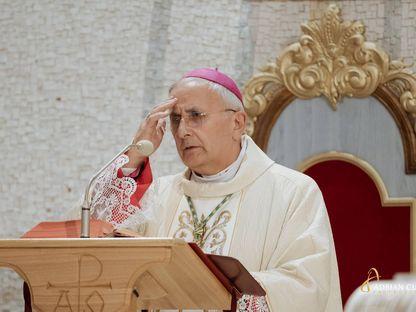An orange tent is floating on the sea, in rain and darkness, almost like a hallucination.
Inside, a faint light is shining on the faces of three people.
The Migrants Nobody Wants, Stranded Between Turkey and Greece: "In the sea you don't know if you are dead or you are alive"
English Section
11/07/2022
It's after midnight when we leave the port of Çeşme in a hurry, to meet a Turkish Coast Guard patrol that had spotted a small floating raft somewhere near the Greek sea border.
With searchlights and sirens on, through the fog, the boat we're on looks disproportionately large by comparison, like a spaceship swallowing the tiny life raft whole, pulling it aboard on ropes.
Wrapped in first-aid foils, three men eat biscuits from boxes bearing the logo of the International Organization for Migration (IOM) in the middle of the night, on the Aegean Sea, while other men in white protective suits watch.
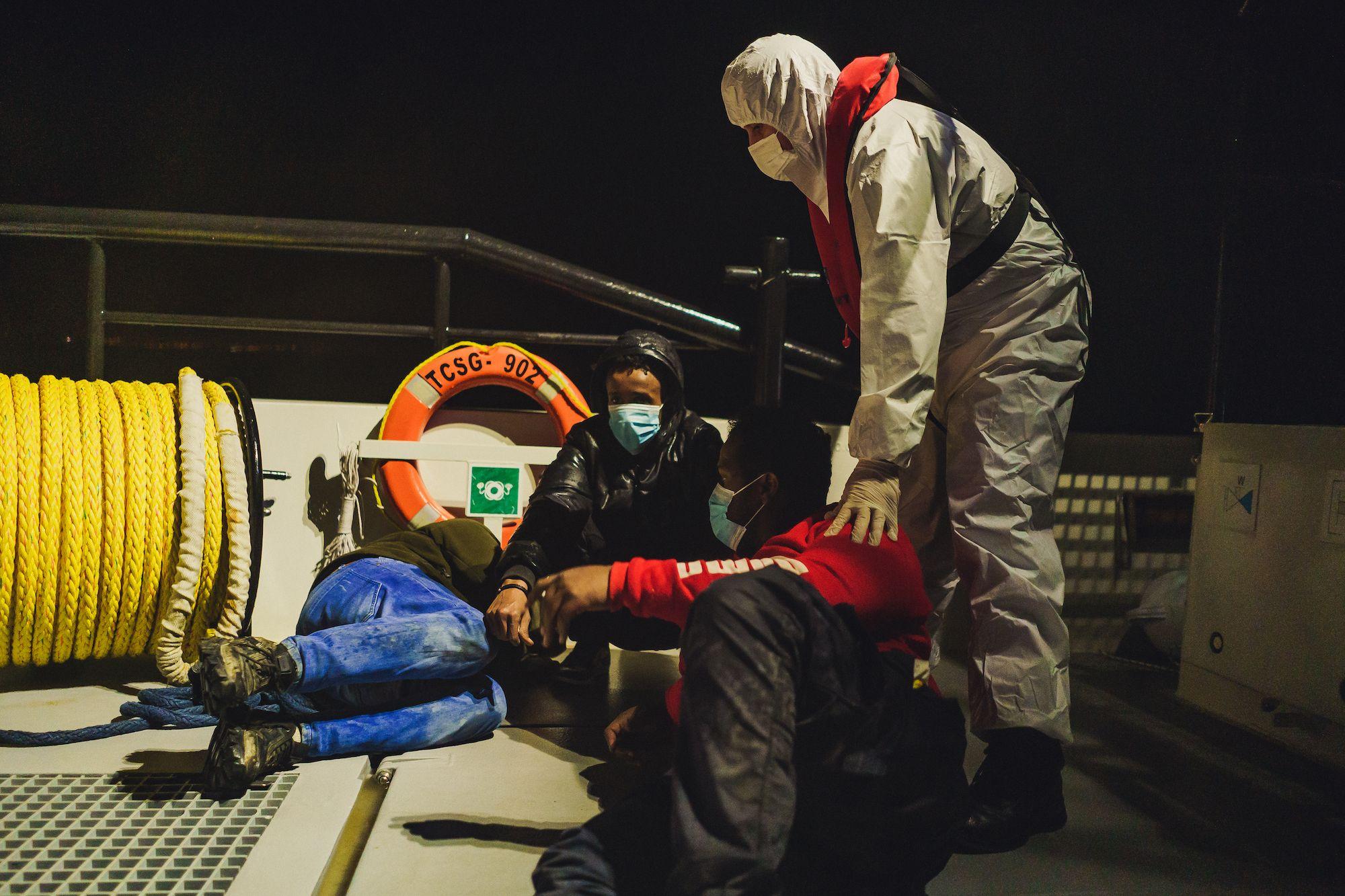
Migrants saved from the middle of the sea by the Tukish Coast Guard Command. Photo: Ioana Epure
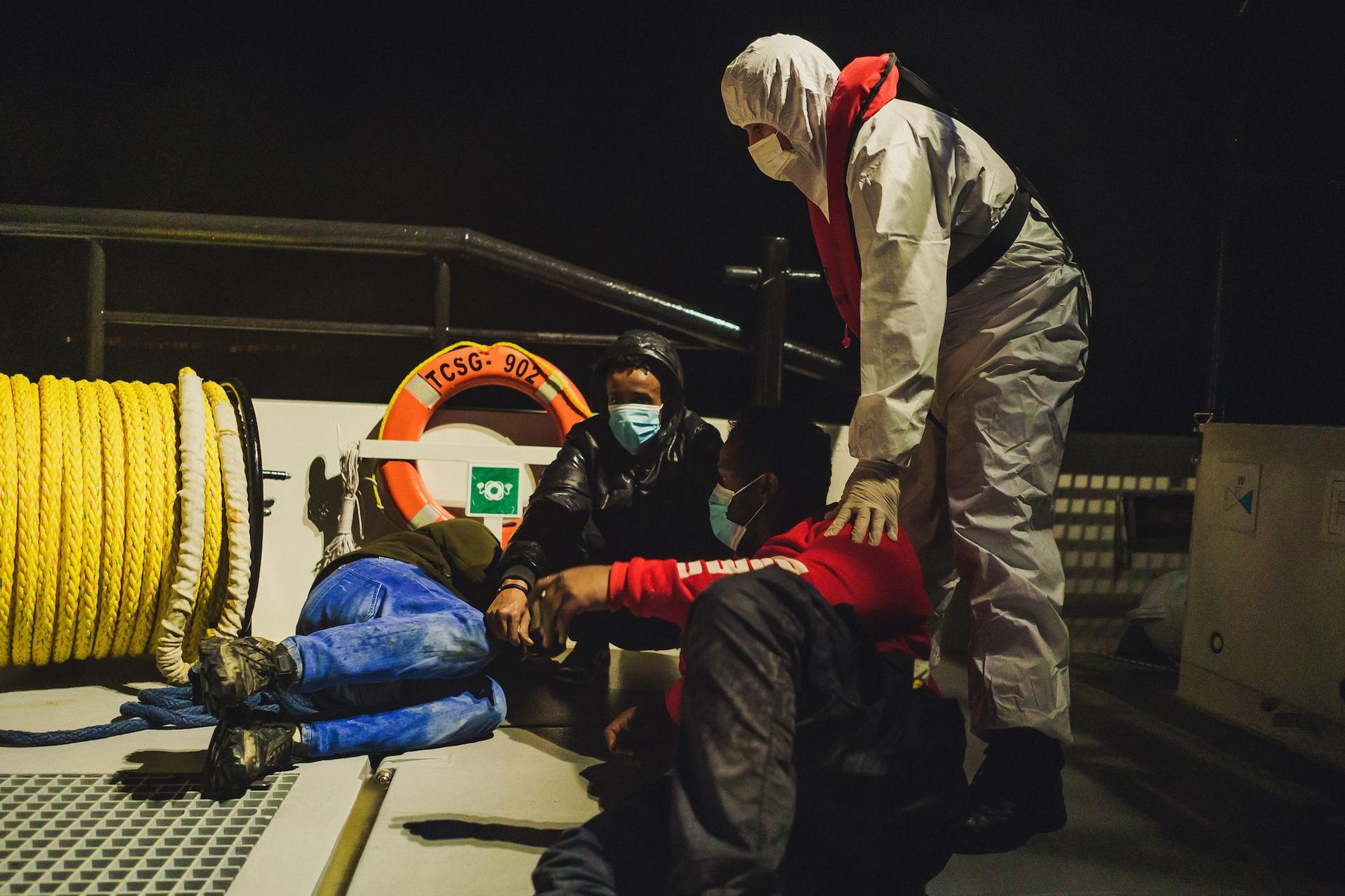
Migrants saved from the middle of the sea by the Tukish Coast Guard Command. Photo: Ioana Epure
A few kilometres away, on the seafront of the small tourist town of Çeșme, street dogs pick up pieces of bread that have fallen off tables and scrounge under benches and chairs. The bars have already closed and tourists are sheltered in their hotels, disappointed by the clouds that spoiled their party.
Officially, there are 15 kilometres between Çeșme, Turkey and the Greek island of Chios. In some areas, however, the distance is no more than seven kilometres.
The island of Chios, as seen from the Turkish Coast Guard boat.
It is among the shortest sea routes between Turkey and the European Union; and the distance can be covered in just half an hour in an inflatable motorboat.
After Europe closed its gates with the 2016 deal with Turkey, the number of migrant boats trying to cross the strait has dropped significantly. But a silent game of ping-pong with people has begun between Turkey and Greece, taking place almost night after night, in the narrow space between the two shores.
According to the European Center for Constitutional and Human Rights, pushbacks refer to: "a variety of state measures aimed at forcing refugees and migrants out of their territory while obstructing access to applicable legal and procedural frameworks. In doing so, States circumvent safeguards governing international protection (including minors), detention or custody, expulsion, and the use of force."
Mulți ne citesc, puțini ne susțin. Fără ajutorul tău, nu putem continua să scriem astfel de articole. Cu doar 5 euro pe lună ne poți ajuta mai mult decât crezi și poți face diferența chiar acum!
"Please don't use footage with the people on their knees"
The Turkish officers move quickly, their actions lacking the usual pomp. They all wear white protective suits, masks and gloves.
Predator in Robes: The Diocese of Iași and the Vatican Buried a Sexual Assault Committed by a Catholic Priest Against a Minor in Bacău, Failing to Alert Prosecutors
A Roman Catholic priest abused a 13-year-old girl in the parish where he served in Bacău County: the bishop of Iași knew about it, sent the case to the Vatican, and applied canonical sanctions, but did not notify the authorities, who only intervened later and sentenced him to prison.
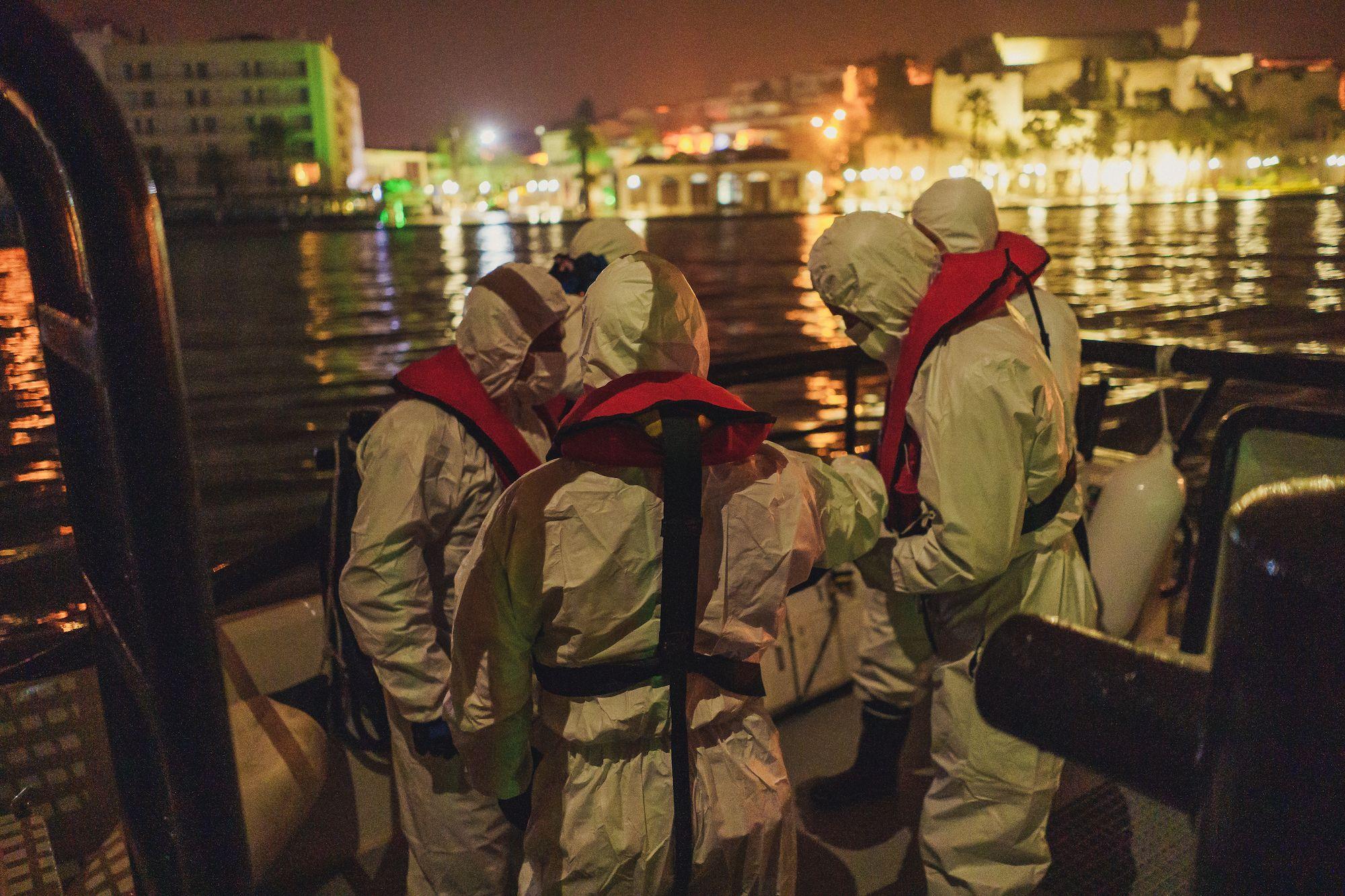
The rescue team of the Turkish Coast Guard Command. Photo: Ioana Epure
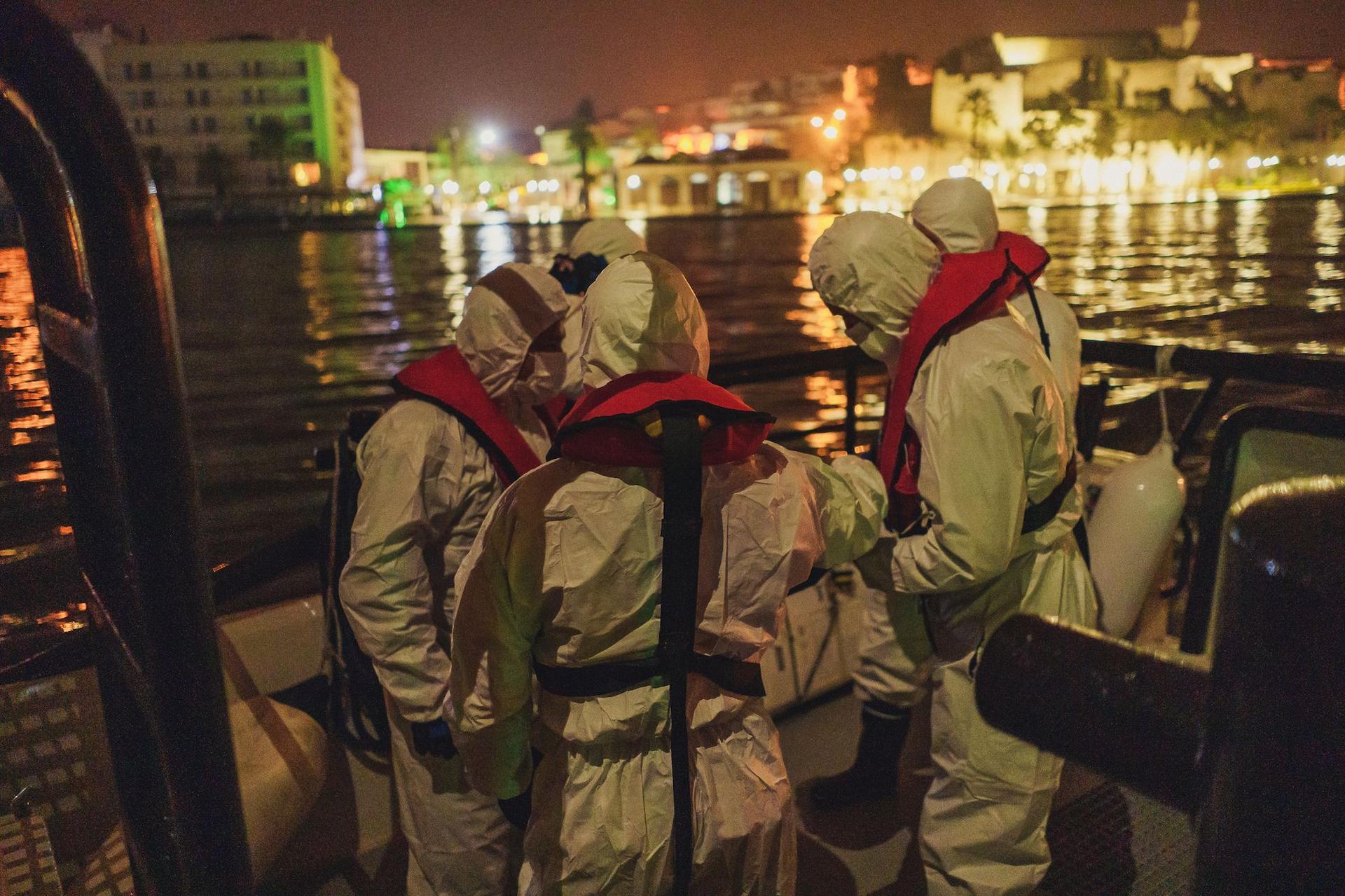
The rescue team of the Turkish Coast Guard Command. Photo: Ioana Epure
About fifteen minutes after our departure from the port, we see the raft in the distance, in the spotlights, and silhouetted against the thermal scanners inside the Turkish Coast Guard boats.
"We do this almost every day and night," a senior officer says, as we approach the raft. All the officers wished to remain anonymous.
Un newsletter pentru cititori curioși și inteligenți.
Sunt curios
"Please don't use the footage of people on their knees as they crawl out of the raft," he asks, as his colleagues pull the orange floating tent aboard the Coast Guard boat, along with the three men, who have been adrift at sea for nearly three hours.
They are three men from Yemen. One is using crutches in order to walk. None of them are talking and the rain is falling ruthlessly on all of them.
The floating tent in which the three Yemenis were found is the classic Lalizas ISO RAFT, a product manufactured in Greece by a company that supplies, under contract with the Greek state, rescue equipment to the Navy. The orange raft has been the subject of countless investigations into potential pushbacks.
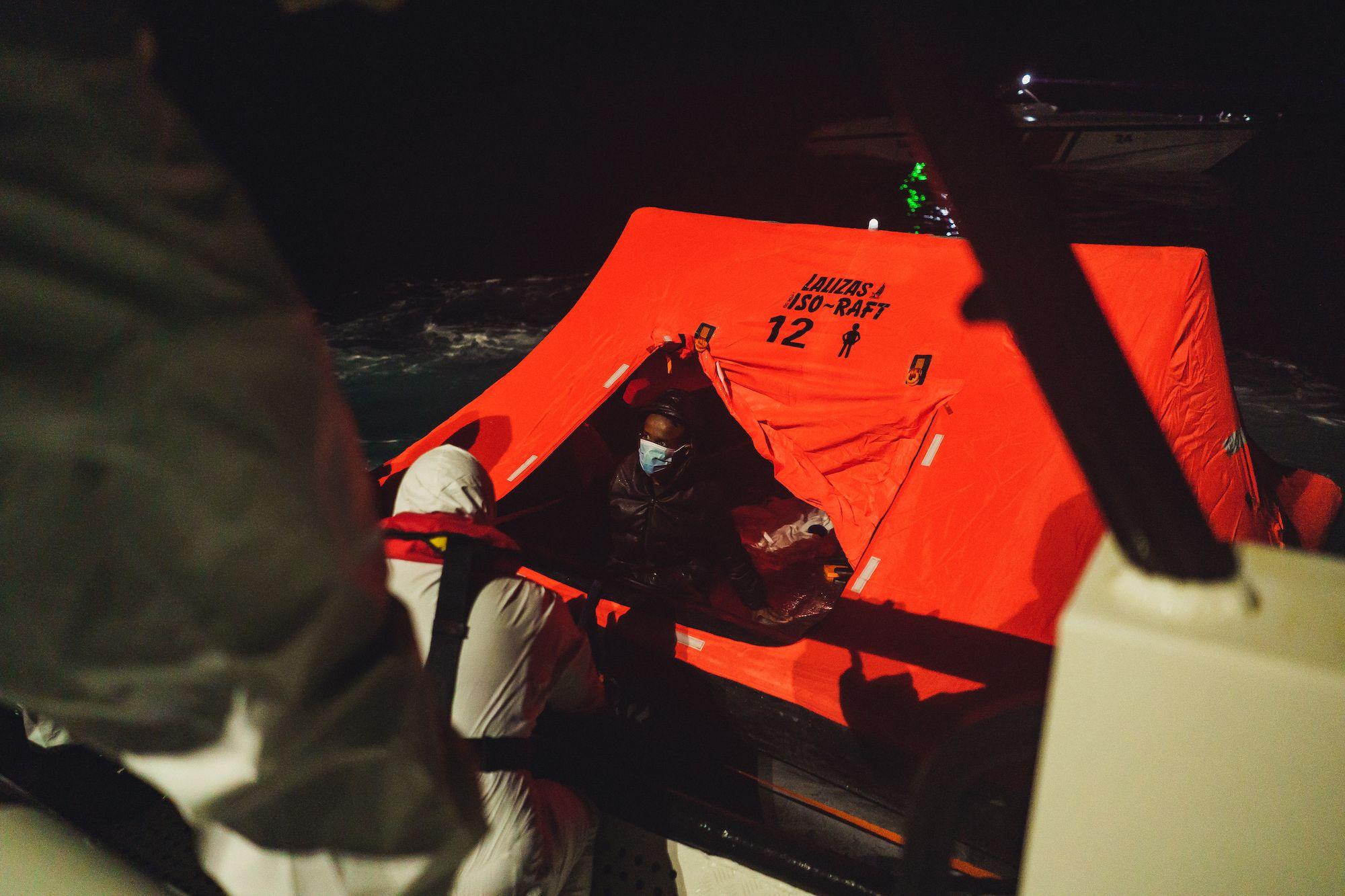
Three men from Yemen were rescued from the life raft. Photo: Ioana Epure
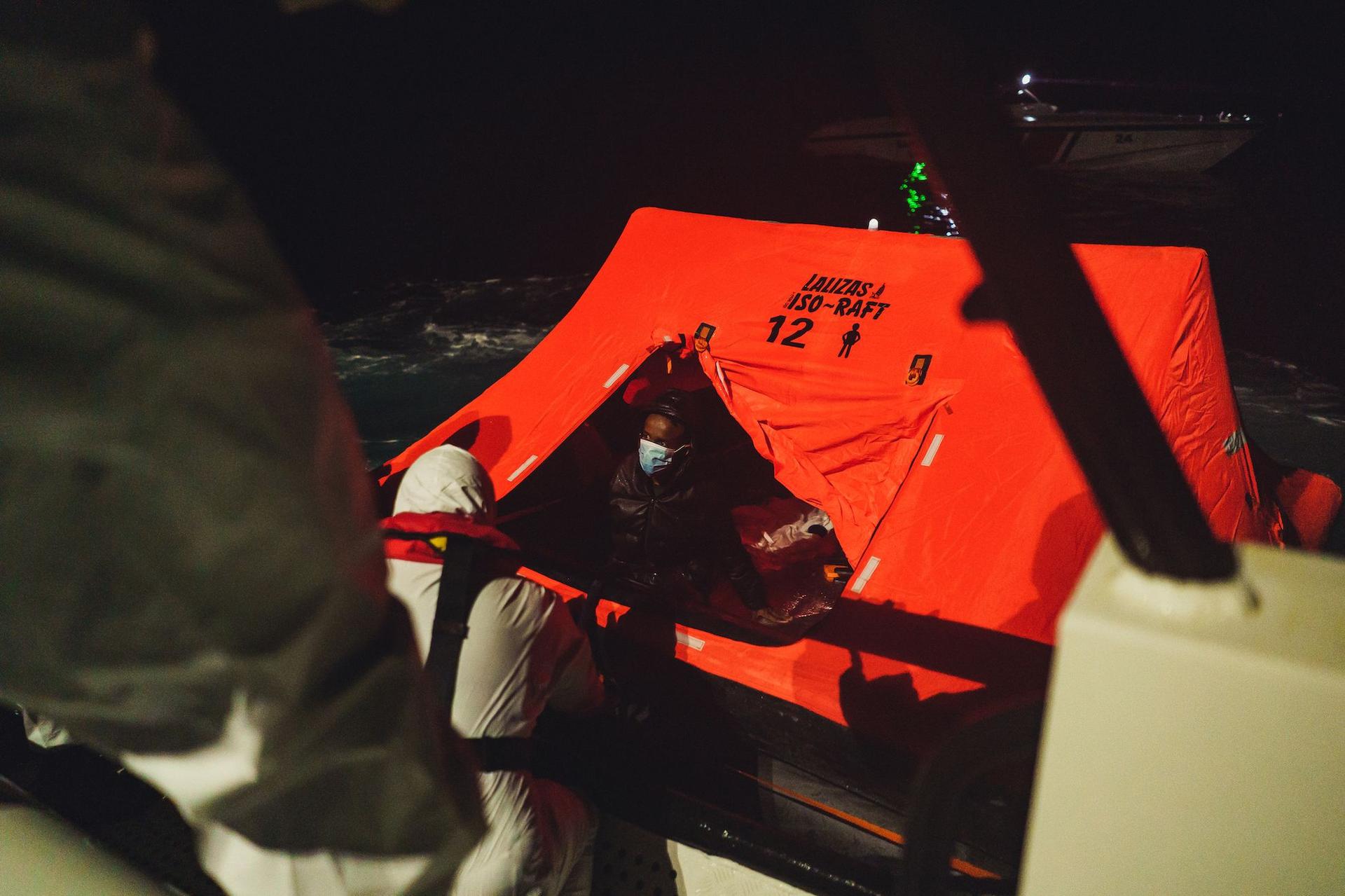
Three men from Yemen were rescued from the life raft. Photo: Ioana Epure
Virtually any journalist or activist who has ever come into contact with these incidents would be able to guess, without much difficulty, what type of craft the people were found on at sea. The orange tent would probably be their first choice.
"Look, instructions in Greek," the officers say, and show us the plastic-wrapped instruction booklets.
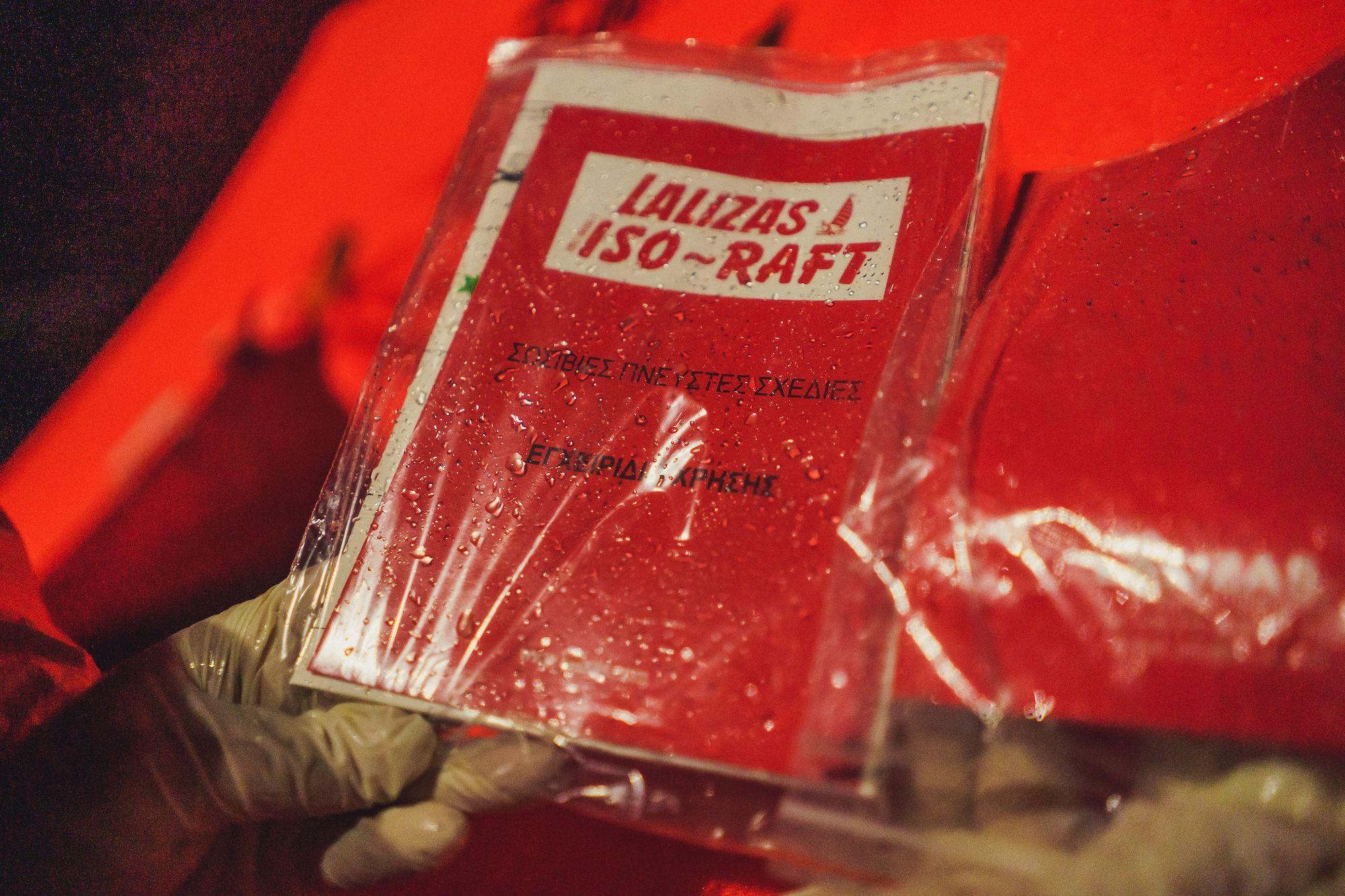
The instructions left in the Greek life raft are also in Greek. But this does not prove that the Greek authorities were in any way involved in the pushback of the three men from Yemen. Photo: Ioana Epure
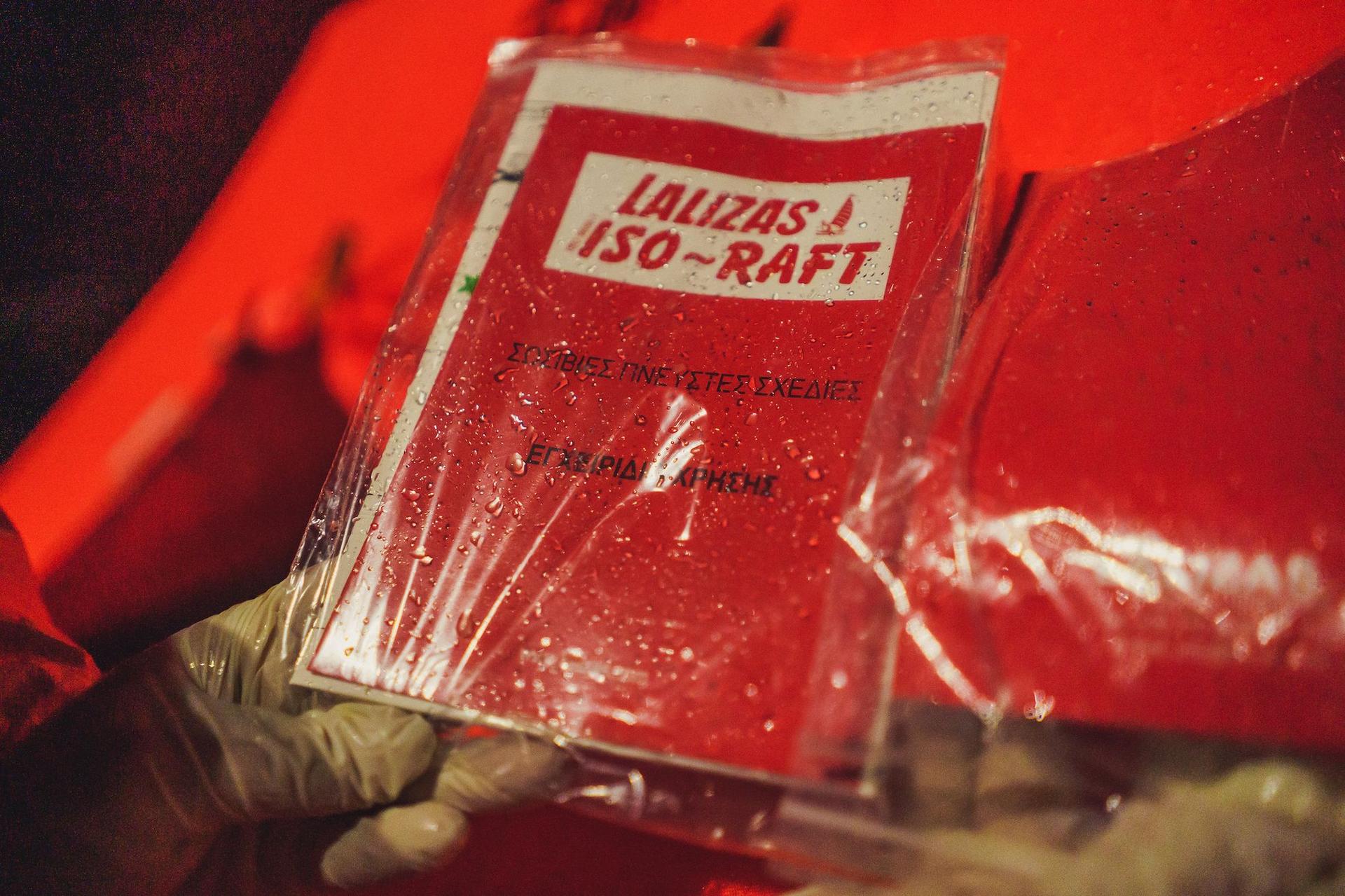
The instructions left in the Greek life raft are also in Greek. But this does not prove that the Greek authorities were in any way involved in the pushback of the three men from Yemen. Photo: Ioana Epure
Whoever put them on the raft, at least was considerate enough to show them how to use it.
Kidnapped, Robbed and Abandoned at Sea
"I'm 17 years old and I'm from Yemen," the man begins his story. We're back on shore, it's past three in the morning, it's cold and it's still pouring. He has just been questioned by the Coast Guard and by an IOM representative.
He's the only one of the three rescued men who speaks English and the only one who still seems functional after this endless night. We are, almost ironically, in a tent. An open tent, right on the edge of the water, where the men were brought after a photo session with the Coast Guard, which uses the photos and footage on the official website page that records the events.
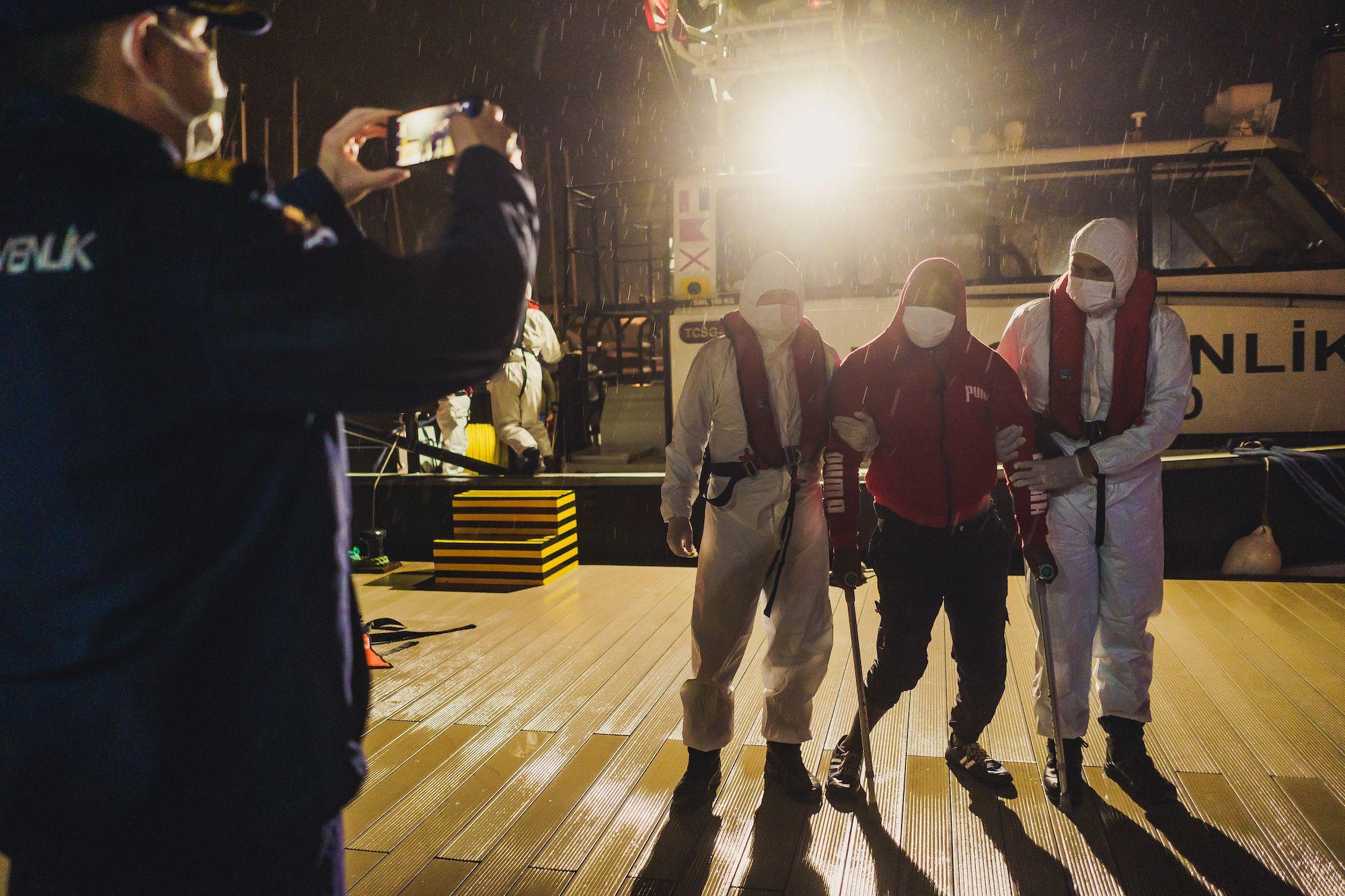
The Turkish Coast Guard photographs the people recovered from the sea for their database. Photo: Ioana Epure
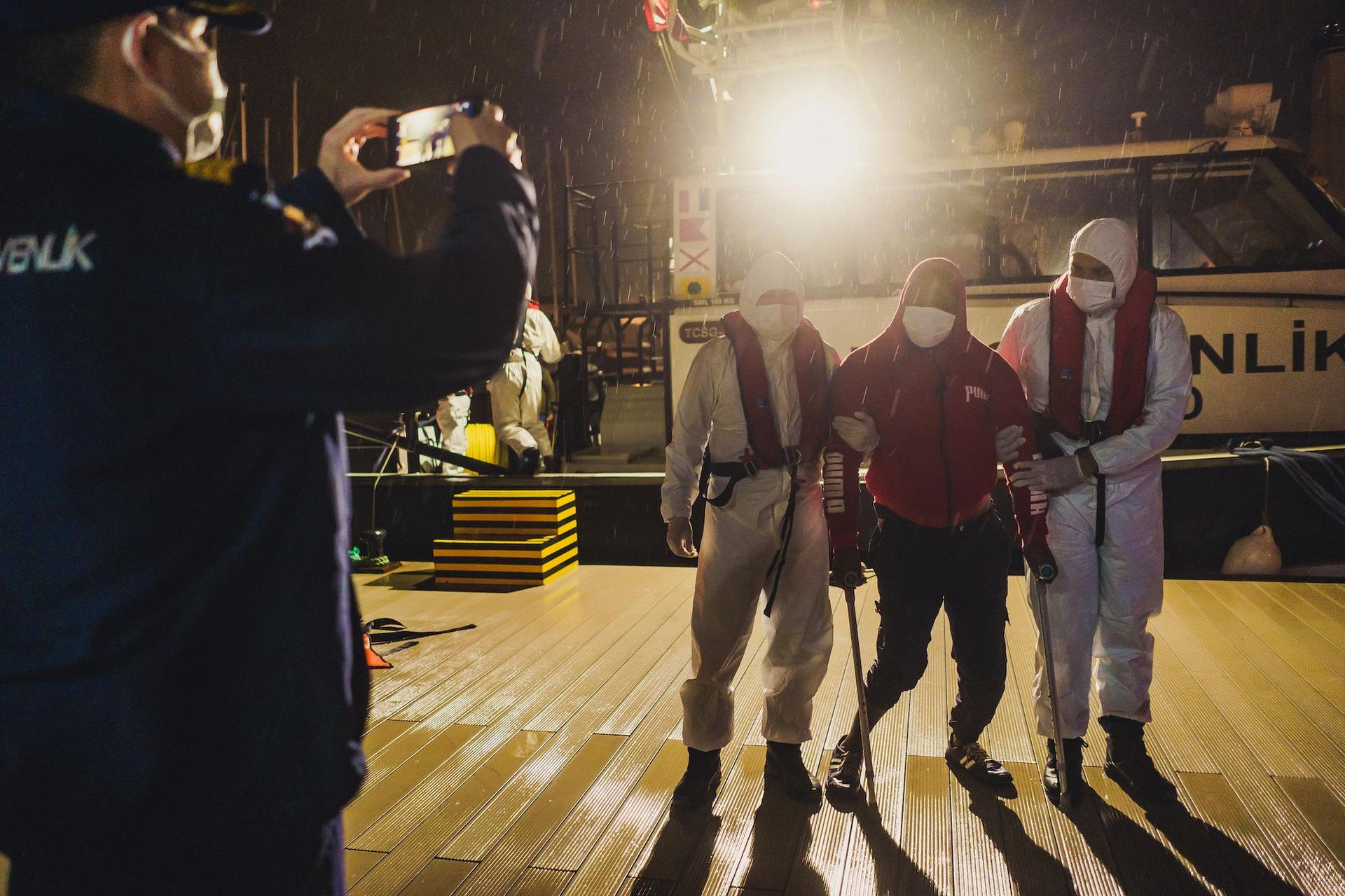
The Turkish Coast Guard photographs the people recovered from the sea for their database. Photo: Ioana Epure
His name is Khaled and he doesn't look 17. He says he arrived in Turkey eight months ago but had nothing to live on because he had no work, so he decided to cross over to Greece. This is his second attempt: the first time, the boat he was trying to cross didn't even make it to Chios, it was allegedly turned away by the Greek authorities.
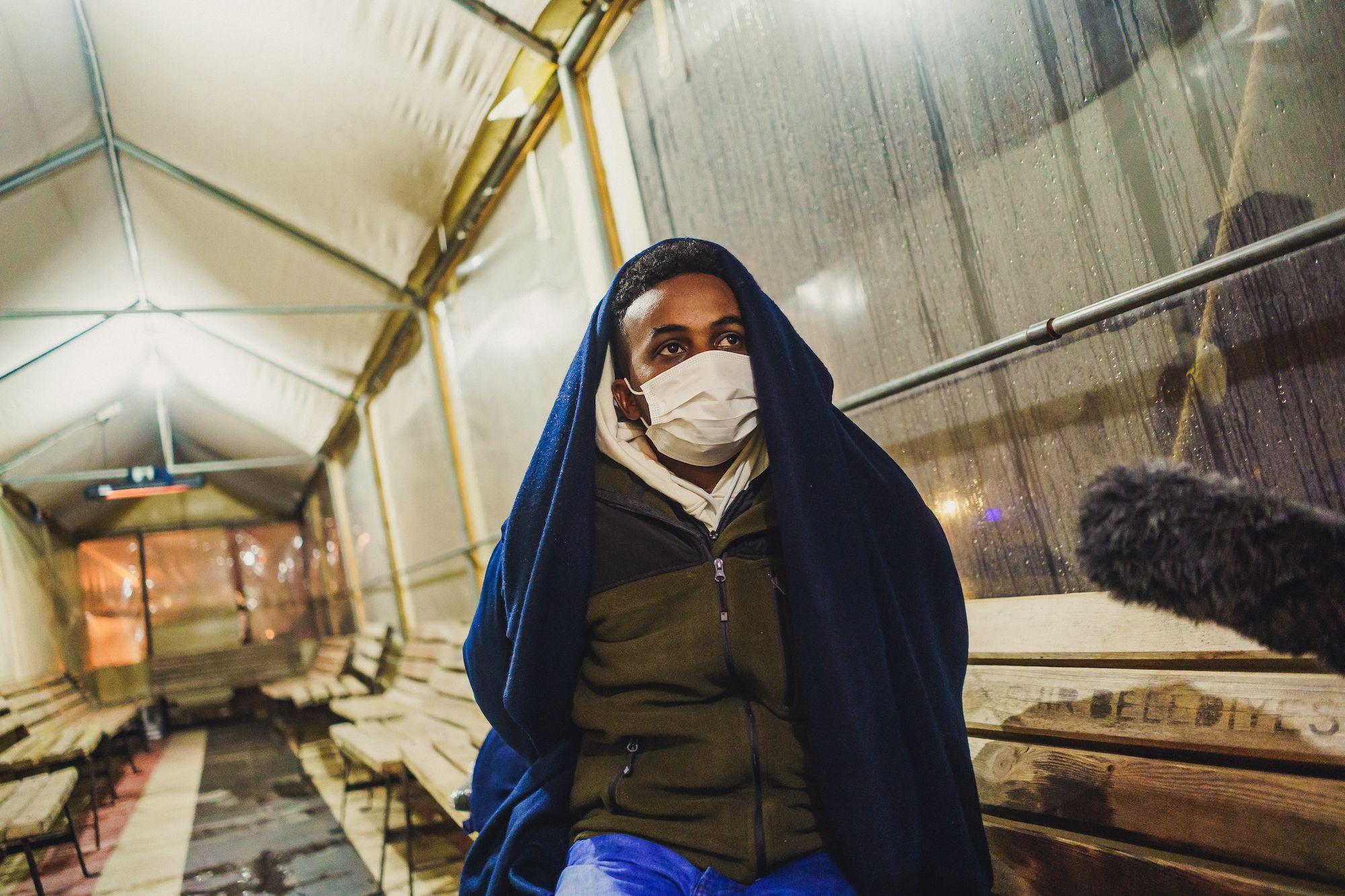
Khaled, 17, from Yemen. Photo: Ioana Epure
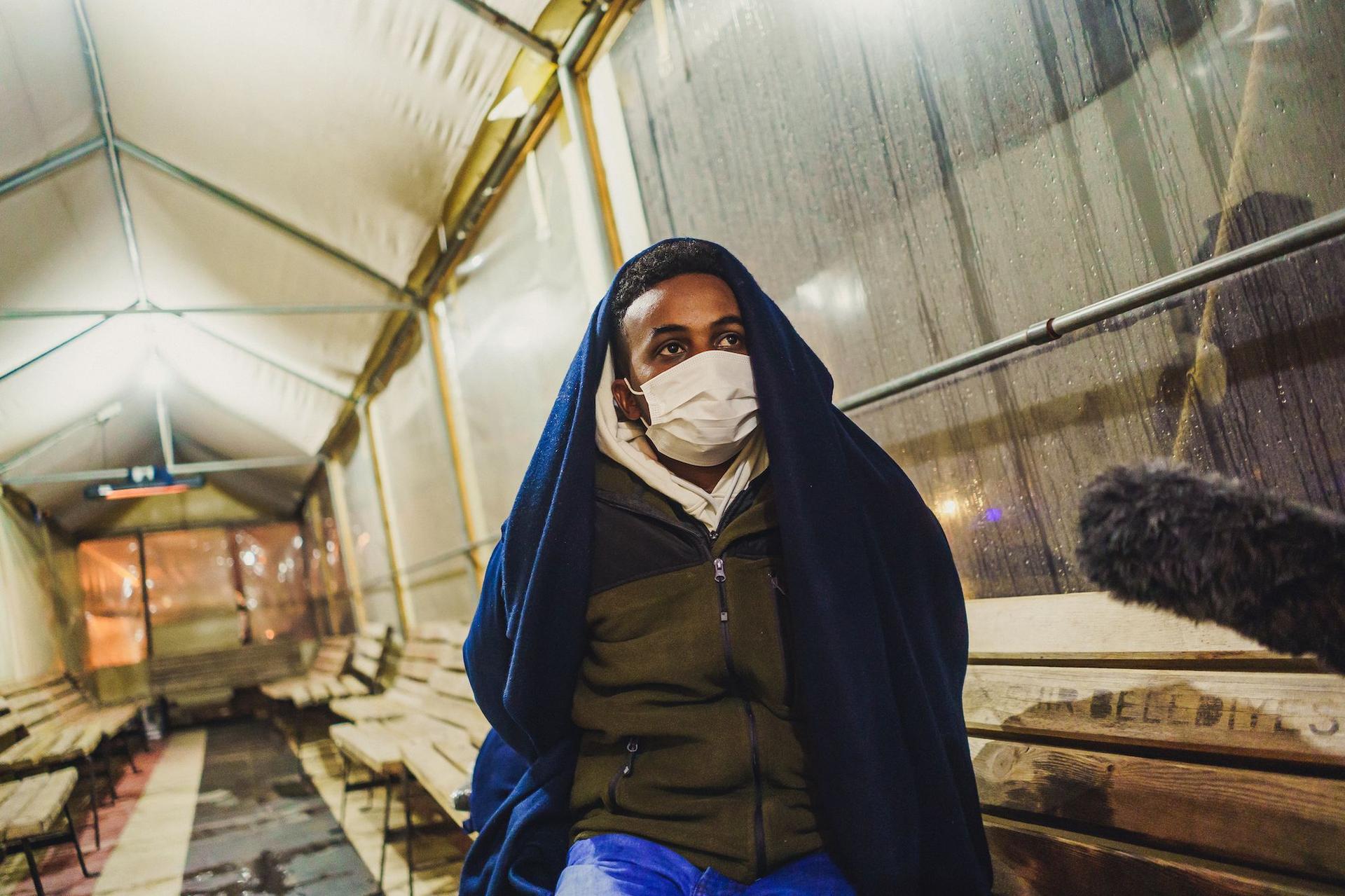
Khaled, 17, from Yemen. Photo: Ioana Epure
This time he had better luck, up to a point: he reached the island of Chios, with a group of 16, two days earlier. But once there, Khaled claims that he and the two men he was found with were kidnapped by men wearing balaclavas, robbed, tied with their hands behind their backs and locked up somewhere (he can't describe exactly where, though).
Two days later, with no money and no phones, the men were allegedly put on a boat, taken out to the middle of the sea, and abandoned on the life raft.
Khaled's journey from Yemen to Syria (where he lived for a year, he says) ended on an orange floating tent.
"When you're at sea, you don't know if you're dead or alive," he says.
In the reception room of The Coast Guard Headquarters, the senior officer who accompanied us on patrol serves us tea while, in the swirl of endless rain and the banter of a Turkish soap opera that seems to amuse him, we wait for permission to speak to Khaled.
"The Greeks see the boats and take their engines and fuel," he says. "Then they force them to turn around. If they are already in Greek waters, they pull them out to sea. Or they pick them up from the islands and put them on a life raft out to sea. Then they let us know. They send us an e-mail with the coordinates."
They also received a message tonight, he says. He shows it to us: it's on JRRC Piraeus (Joint Rescue Coordination Centre) letterhead and dated 21.35 UTC, 0.35 local time. The message gives basic information about the existence of a craft and the coordinates where it can be found.
We are not allowed to take pictures of it. Despite our repeated requests, we never received a copy of the message.
Pushback, push-forward
Any investigation into the migrant boats between Greece and Turkey will inevitably run into two conflicting stories.
For their part, the Greeks claim to be fighting illegal migration on their own.
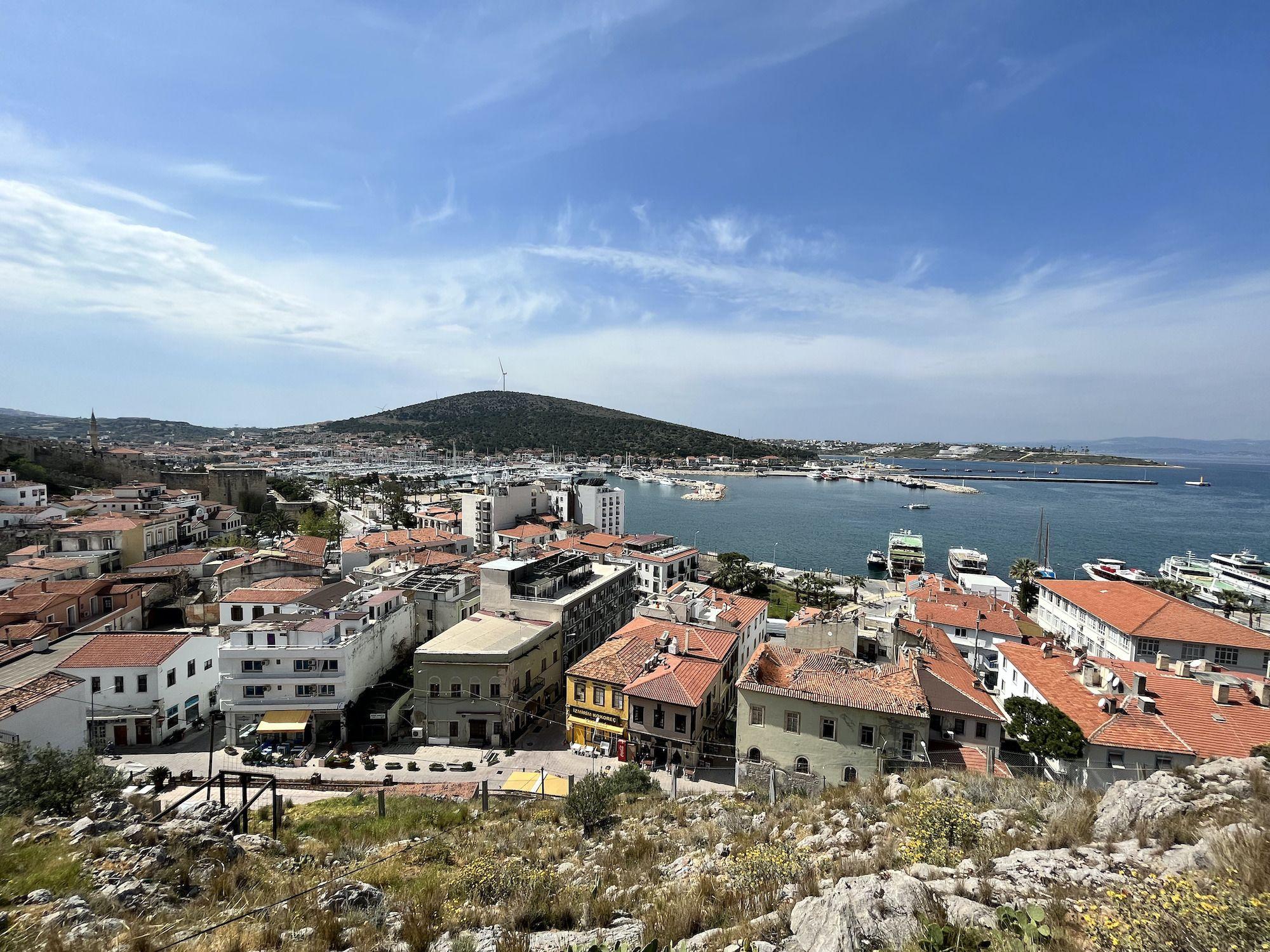
Çeșme is a popular holiday resort in Turkey. Photo: Ioana Epure
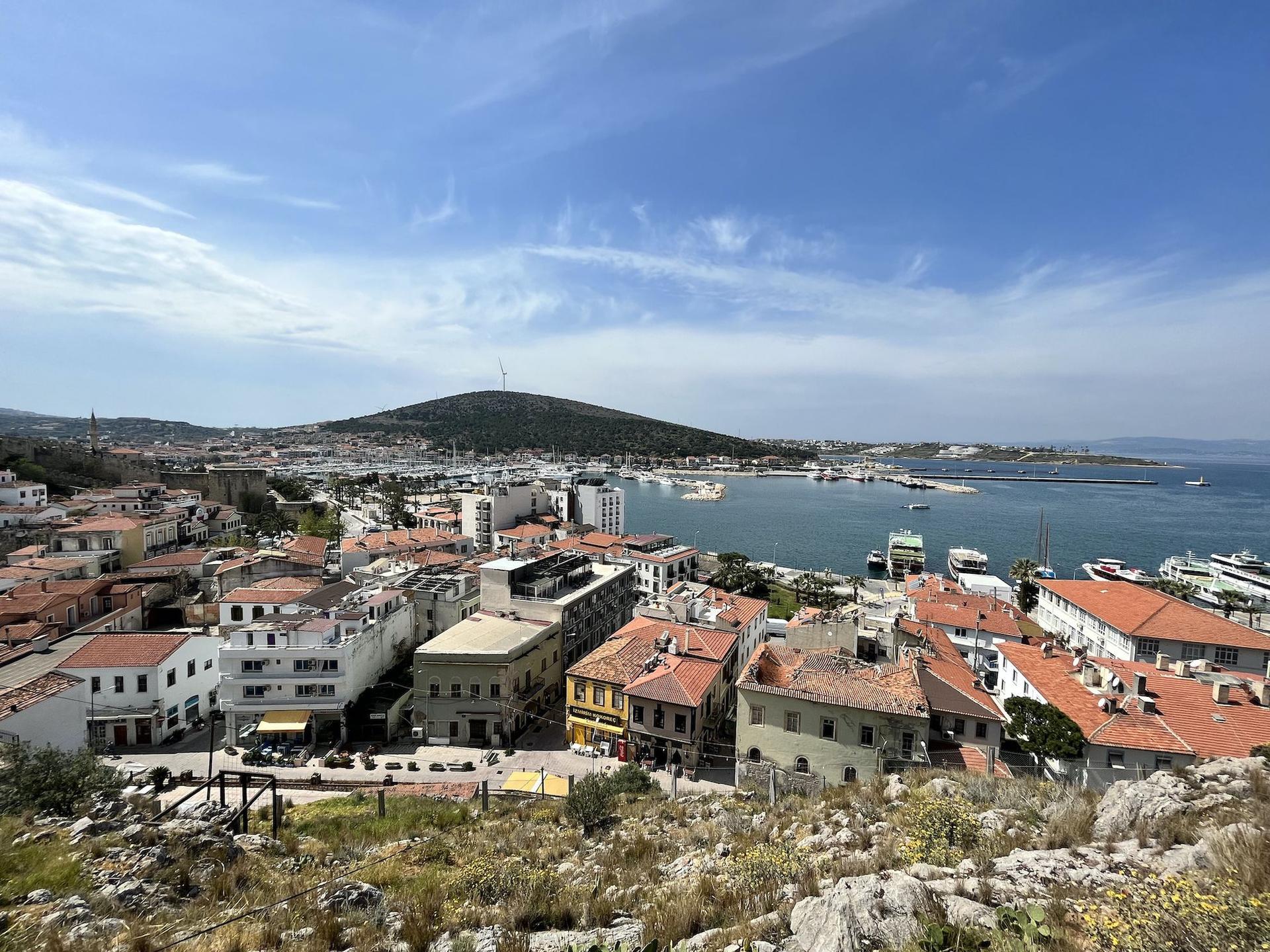
Çeșme is a popular holiday resort in Turkey. Photo: Ioana Epure
In their view, Turkey is using the power of the EU-Turkey deal as leverage - as it did in early 2020, when President Erdogan opened the border with Greece, to force the European Union to continue funding the €6bn pact signed in 2016.
The term "pushback" is not a legal term, though, but a political one. In fact, Article 33(1) of the 1951 Geneva Convention contains the "Prohibition of Expulsion or Return", also known as "the principle of non-refoulement" or "no pushback".
"No Contracting State shall expel or return («refouler») a refugee in any manner whatsoever to the frontiers of territories where his life or freedom would be threatened on account of his race, religion, nationality, membership of a particular social group or political opinion."
However, pushbacks often occur outside the territories of states, for example, on high seas, because Article 33 has been interpreted as applying only within borders, or wherever states have effective control over asylum seekers.
In recent years, the Greek state has been accused, on numerous occasions, of pushback actions, both at sea and in the Evros river area, on the border with Turkey.
We spent four nights in Çeșme between April 14 and April 18, 2022, during which time we accompanied the Turkish Coast Guard Command on multiple patrols. During this time, there were 11 such events, totalling 241 people.
The Turkish version is that Turkey has taken in more refugees than any other country - it currently hosts around 4 million refugees, of which around 3.7 million are from Syria - but that it has to shoulder the burden alone.
For Ankara, the EU has one single mission: to keep the migrants out. And when Greece commits human rights violations at the border, the European authorities turn their backs: they're not interested, because as long as the migrants stay outside EU borders, everyone is happy. Turkey thus positions itself as the only country that really cares about the fates of these people.
Between the two countries is Khaled, tossed around like a geopolitical ping-pong ball.
In the first four months of the year, the Greek authorities claim to have prevented 40,000 crossings and, in turn, accuse Turkey of push-forward: deliberately pushing boats carrying migrants trying to flee to Europe into Greek territorial waters.
At the same time, Greece has categorically rejected any accusation of pushback, no matter how much evidence has been provided by activists, journalists or even a March 2021 report by the Council of Europe, which states that:
"(...) pushbacks generally involve blocking dinghies from landing on Greek soil, either by preventing them from docking until they run out of fuel or disabling the engine. The dinghy is then pushed back into Turkish territorial water by means of waves and wind, or towed."
The second type of pushback described in the Council's report occurs when migrants manage to reach Greek territory. They are then detained, threatened, physically brutalised and robbed. "They are then placed in a life raft with no means of propulsion, towed into the middle of the Aegean Sea and left to drift towards Turkish waters."
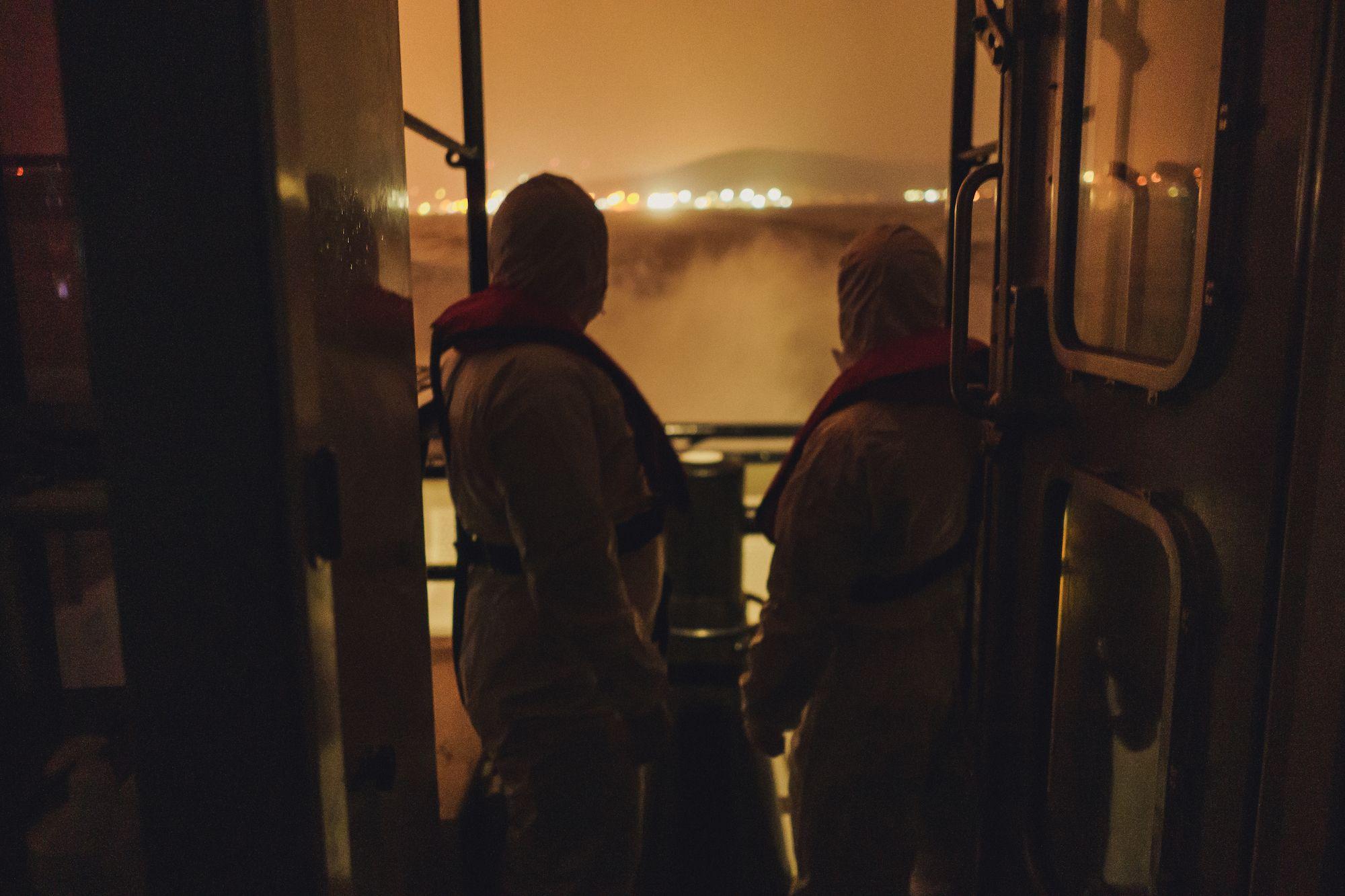
The Turkish Coast Guard rescue team wears protective suits and masks. Photo: Ioana Epure
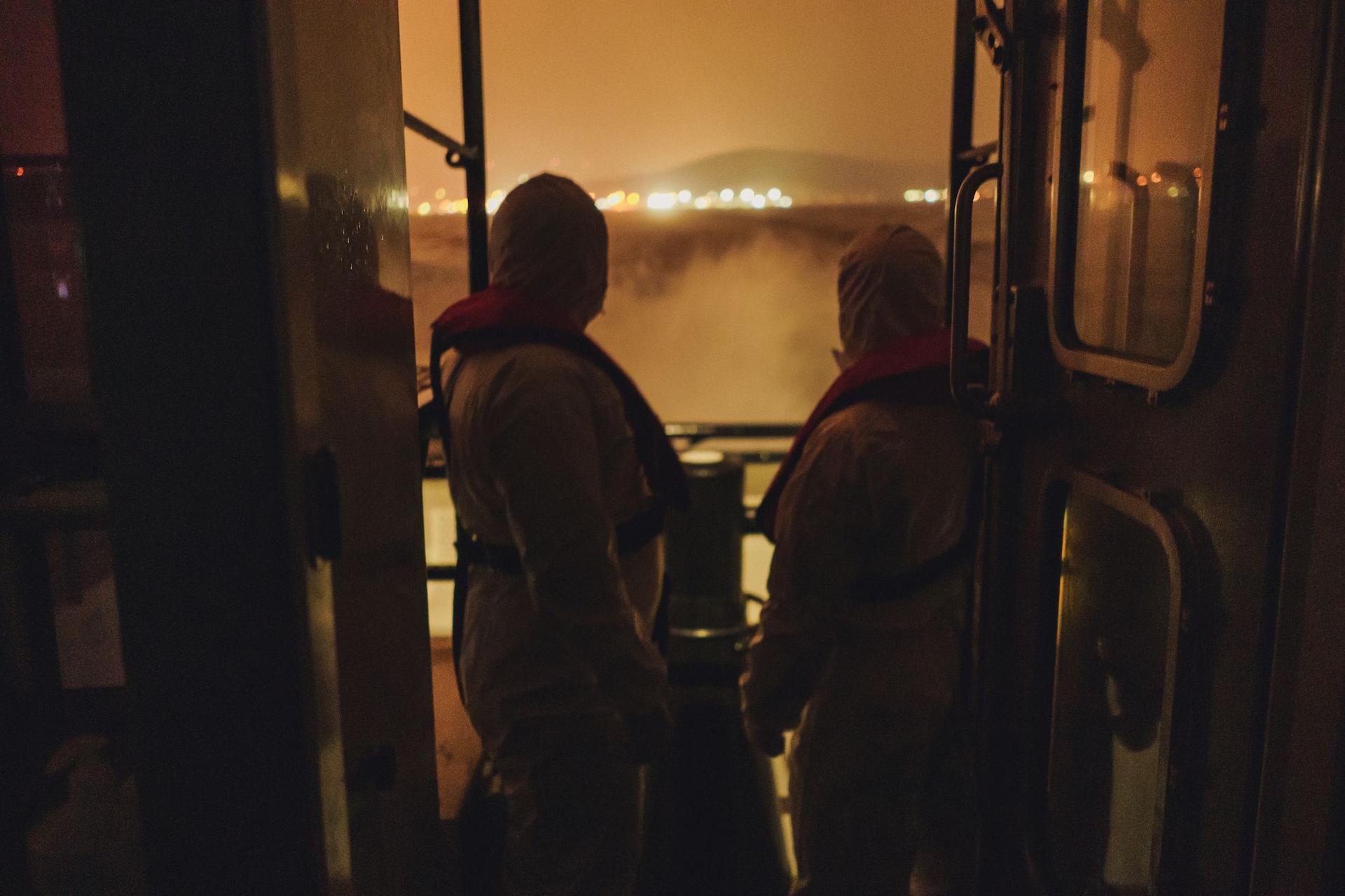
The Turkish Coast Guard rescue team wears protective suits and masks. Photo: Ioana Epure
In addition, the alleged pushbacks sometimes result in standoffs between the Greek and Turkish coast guards, with both remaining on standby. Again, ping pong.
A Der Spiegel, Lighthouse Reports and LeMonde (among others) investigation in April 2022, which analysed videos of incidents of this kind from the Frontex database, concluded that nearly 1,000 people were pushed from Greece into Turkey.
At the same time, after footage of a pushback in 2020 was leaked to Der Spiegel, former Frontex director Fabrice Leggeri was accused of covering up these illegal pushbacks and, following an European Anti-Fraud Office investigation, resigned from his post on April 28, 2022.
Khaled's story is the repetitive scenario that appears in almost all survivor testimonies collected by activists and journalists - few, because people are often left without phones.
"This stuff is pretty well documented, it absolutely happening, the Greek denials make absolutely zero sense," Nick Waters from Bellingcat, who has also investigated the phenomenon, explains to PressOne.
"What we've seen happen is a stand-off: whether they'd been towed there, or they just weren't able to get to land, you'll find a dinghy basically in the middle of the Aegean and it's not clear whether it's in Greek or Turkish waters, they would have the Greek coast Guard on one side, and the Turkish coast guard on the other, and neither of them are willing to pick up and rescue the migrants on the boats. We've had reports of Greek vessels trying to generate waves, to push the vessels back into Turkish waters, Turkish Coast guard pulling similar stunts. The Turkish Coast Guard has certainly not acted in a completely blameless way in these situations either."
Often, people are found precisely in the orange Lalizas rafts, which have become almost a "mascot" of this geopolitical game with people that takes place between the two countries, on the border of the European Union.
The Turkish Coast Guard boat in which Khaled and his friends were brought ashore is also funded with EU money.
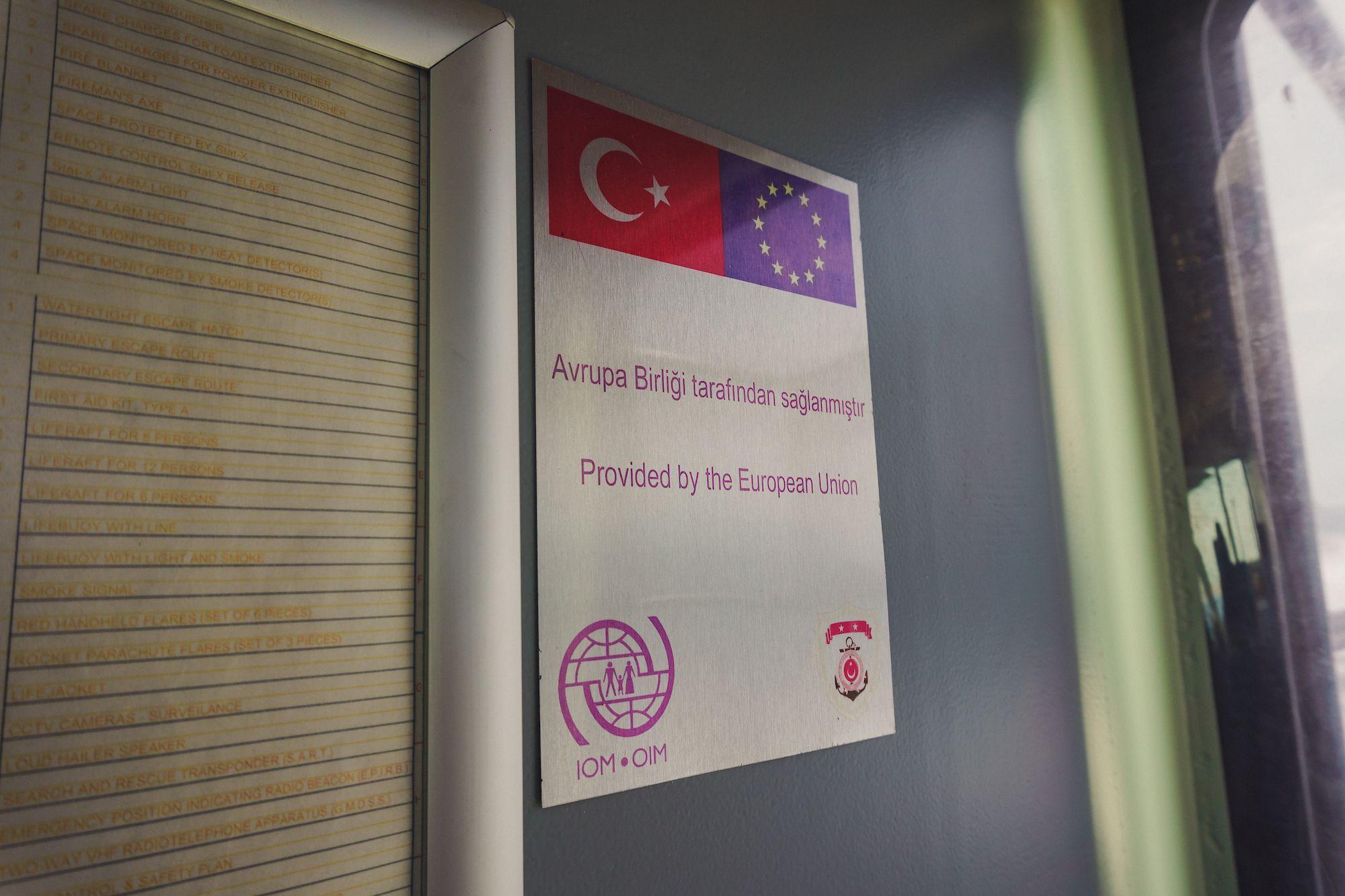
Photo: Ioana Epure
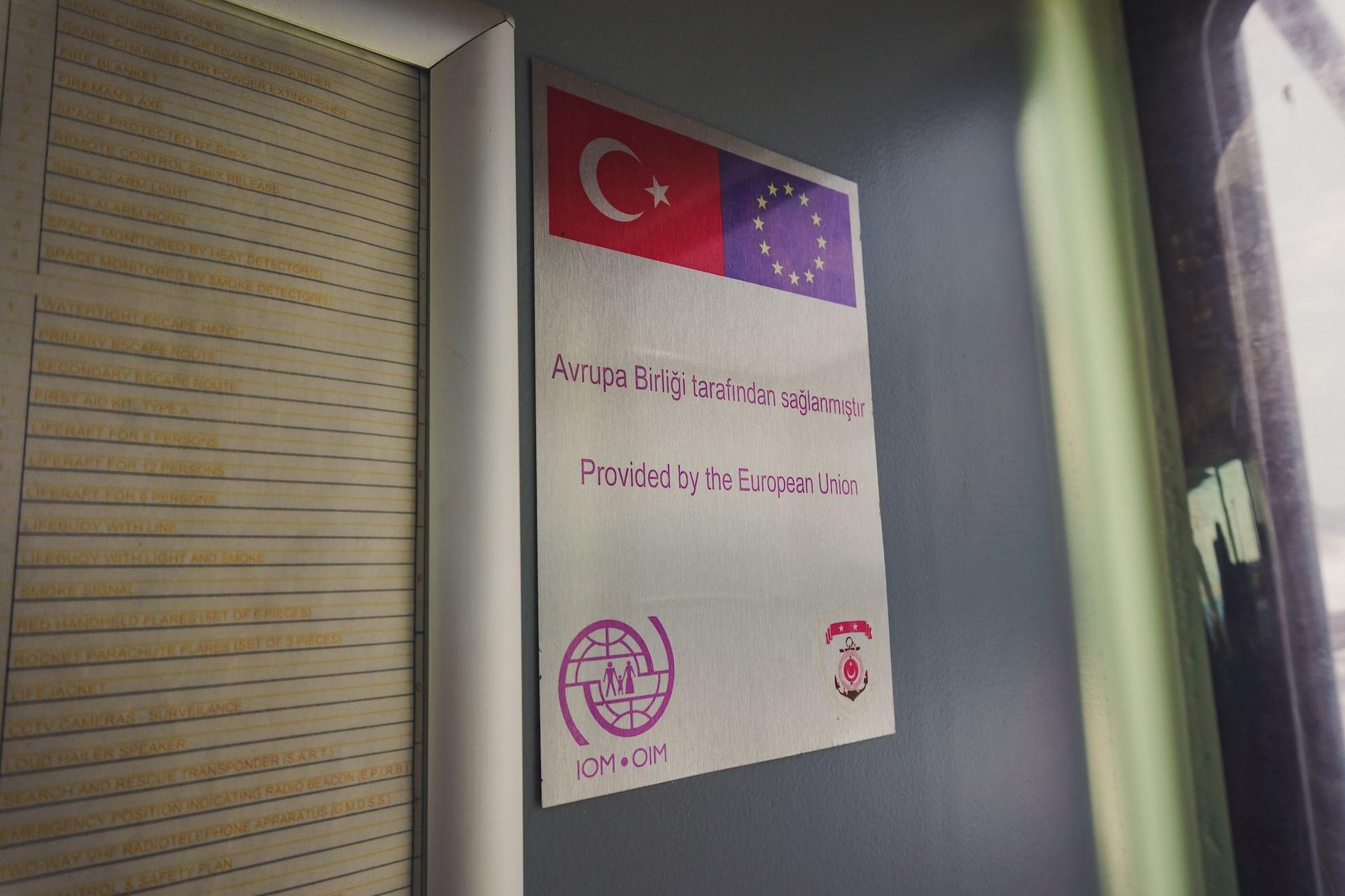
Photo: Ioana Epure
Under the deal signed in 2016, the EU pays Turkey to seal its external border from migrants. Greece, for its part, has received more than €3 billion from the EU to manage the migration problem.
| "Crimes of Peace"In the study of migration, pushback events or forced deportations and their aftermath - shipwrecks in the Mediterranean that have killed thousands of people, sometimes because ships protecting borders tried to prevent boats carrying migrants from crossing, through a disproportionate effort that sank them - are sometimes called, poetically, "crimes of peace".These "crimes of peace" define all forms of institutionalised violence that serve as conservation strategies for our social system. A type of violence that "is no longer attributable to specific individuals and their 'evil' intentions, but is purely 'objective', systemic, anonymous", as Slavoj Žižek calls it, and which leads to the birth of "social indifference to outrageous suffering through institutional processes and discourses" (Nancy Shepher-Hughes, 2004).A series of ruthless procedures that "...develop nearly automatically, and once they start there is a whole machinery that has to conclude its cycle, despite the actual situation of the people involved", as anthropologist Maurizio Albahari sums up in his ethnography on migration in the Mediterranean, "Crimes of Peace: Mediterranean Migrations at the World's Deadliest Border." |
"According to the registered records of our bureau, no such incidents, as described in your request took place"
Following multiple allegations of illegal actions at the border with Turkey and following the investigation by Lighthouse Reports together with nine other publications, the Greek National Transparency Authority carried out an investigation of its own in the first months of April 2022, the result of which was that no evidence was found to support the conclusions of the journalistic investigation.
The report, released on May 10, was however withdrawn three days later because the names of the people interviewed and, in some cases, telephone numbers, had been, accidentally, made public, following a regrettable editing error.
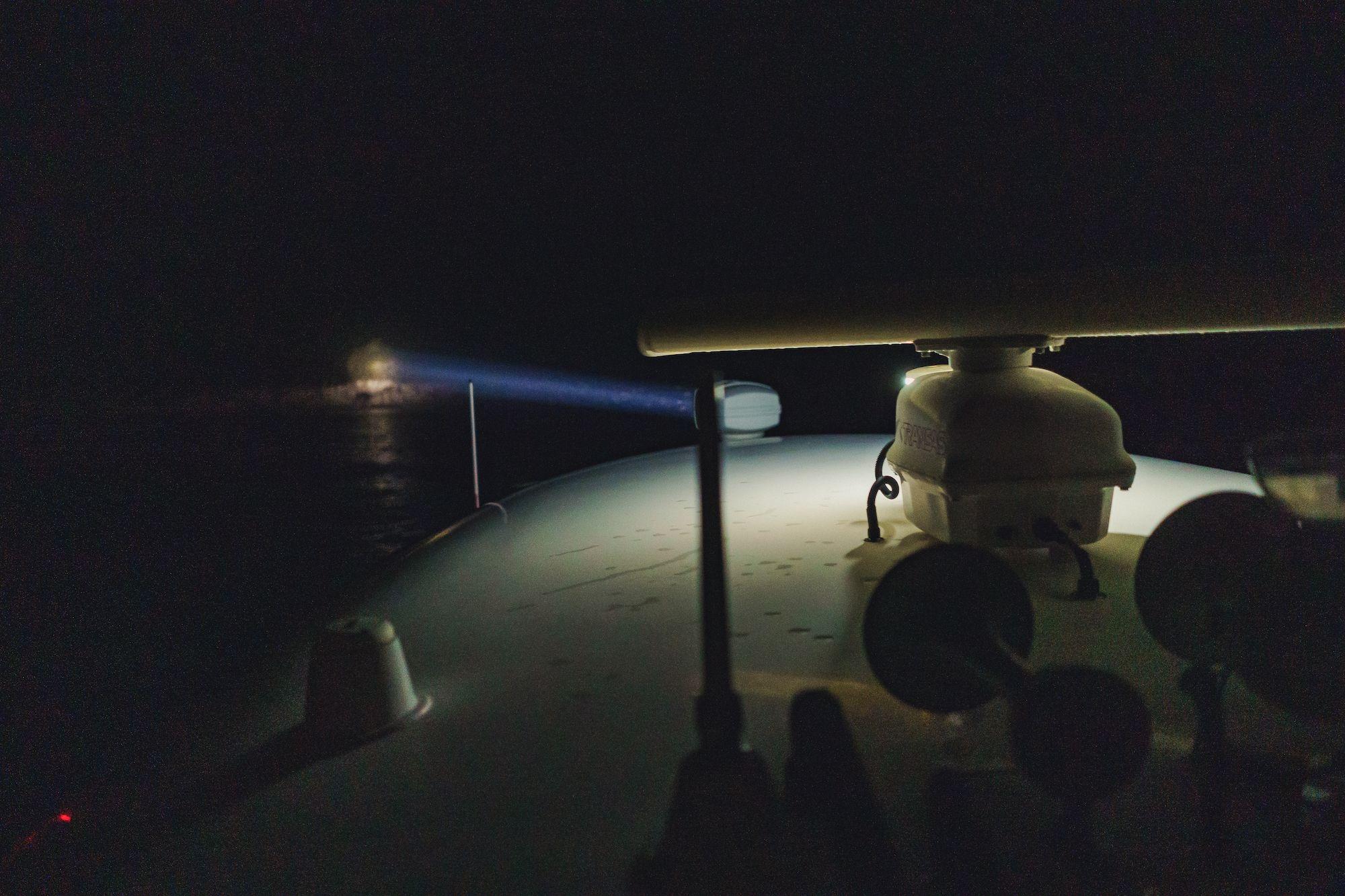
The spotlights of the patrol boats, pointed towards the shores, in search of illegal migrants. Photo: Ioana Epure
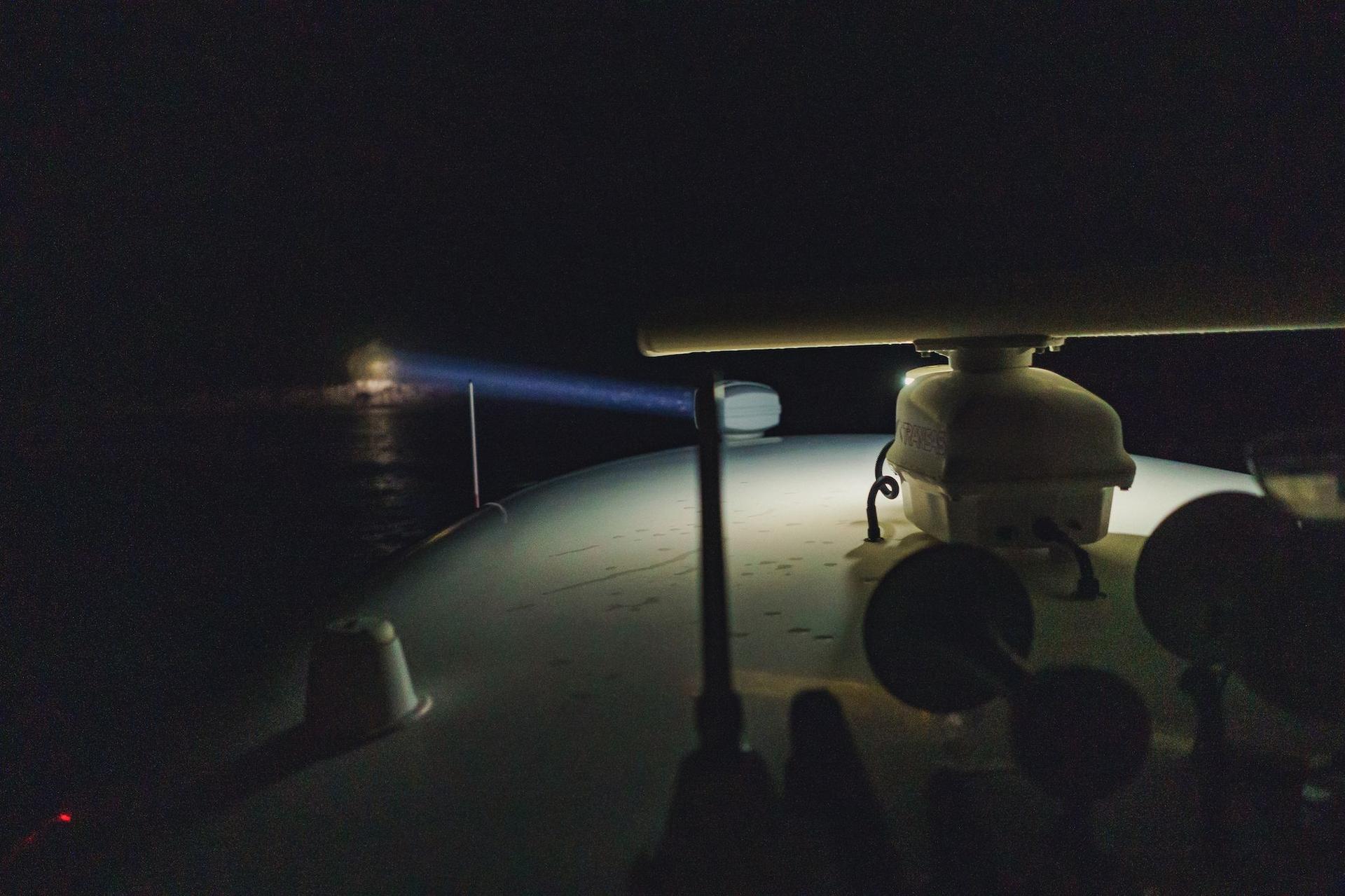
The spotlights of the patrol boats, pointed towards the shores, in search of illegal migrants. Photo: Ioana Epure
Similar to the report's findings, in response to PressOne's request regarding the April 18 event we witnessed, the Greek Ministry of Shipping and Island Policy claims that:
"[The officers of the Hellenic Coast Guard's] actions are carried out in full compliance with the country's international obligations, in particular the United Nations Convention on the Law of the Sea, the International Convention for the Safety of Life at Sea and the International Convention on Maritime Search and Rescue.
(...) As for the tendentious allegations of supposed illegal actions, we must emphasize that the operation
practices of the Greek authorities have never included such actions. What’s more, internal investigative
and disciplinary control mechanisms are fully implemented in cooperation with the judicial authorities
and other competent bodies, whenever it is necessary.
In conclusion, we inform you that, according to the registered records of our bureau, no such
incidents, as described in your request (paragraph number 3) took place. Also, the communication
between the Greek and the Turkish JRCCs is taking place by any appropriate means, including e-mails."
Detention Centres for Migrants Who Stopped Coming
From the hill on which the detention centre in Harmandali, a suburb of Izmir, is perched, you can see row after row of ten-storey residential complexes, isolated in the middle of a field. One of them has a swimming pool. Next to them, a herd of goats graze peacefully in the vicinity of a shack, surrounded by plastic bags and bottles.
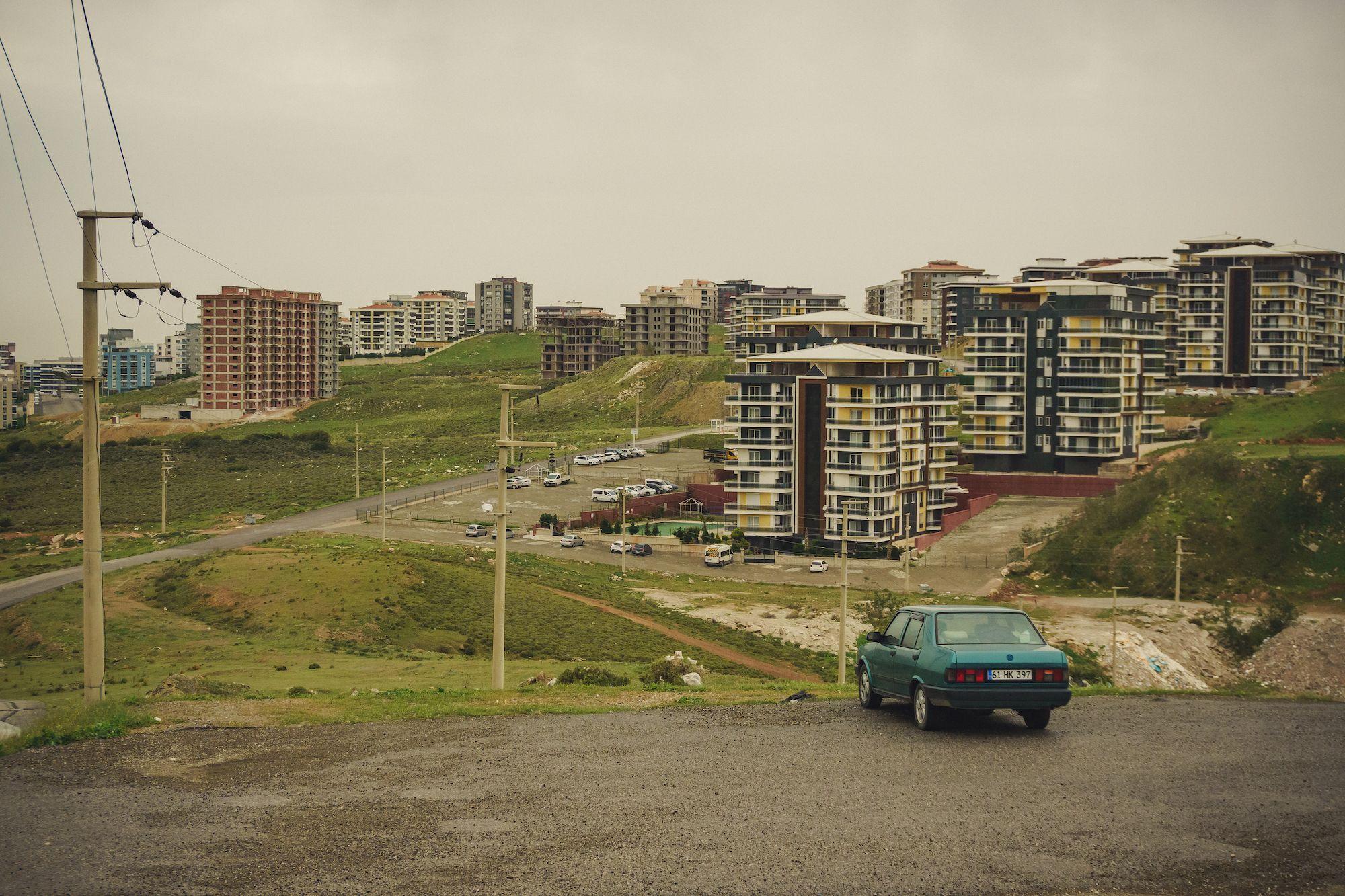
The view from the hill of Harmandali detention centre. Photo: Ioana Epure
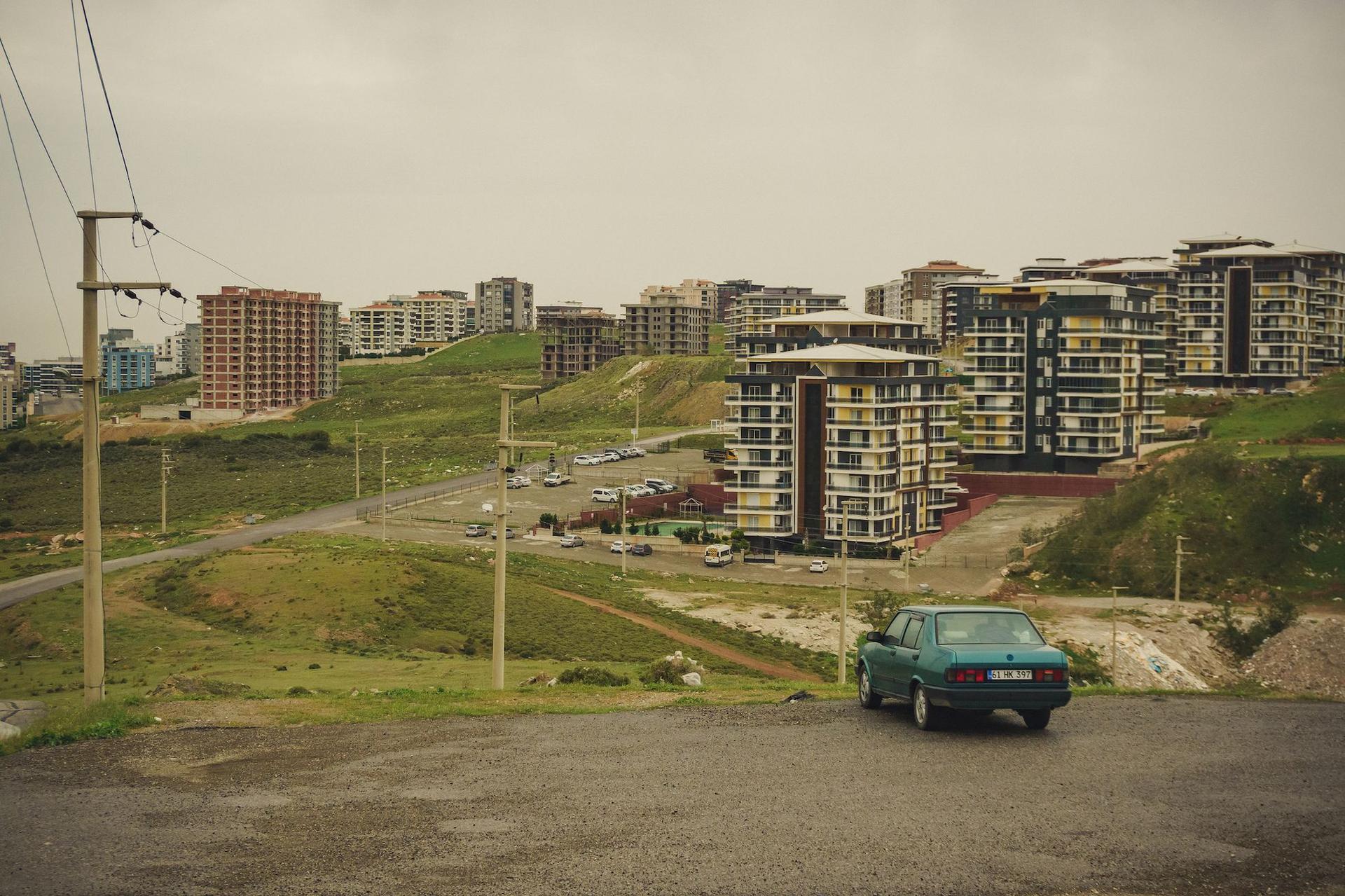
The view from the hill of Harmandali detention centre. Photo: Ioana Epure
Under the dark skies, in the strong wind that almost blows you away, the detention centre building, surrounded by high barbed wire fences, looks almost haunted. Maybe it is: last year a fire at the centre killed a man.
Every once in a while, the families of the people inside arrive at the gate and try enter. Some of them succeed, briefly. They are Syrians, but the language barrier and their suspicion prevent us from learning more. It's Sunday, and the guards at the front desk have just ordered a pizza, which they run through the scanners after being delivered by a young boy on a scooter.
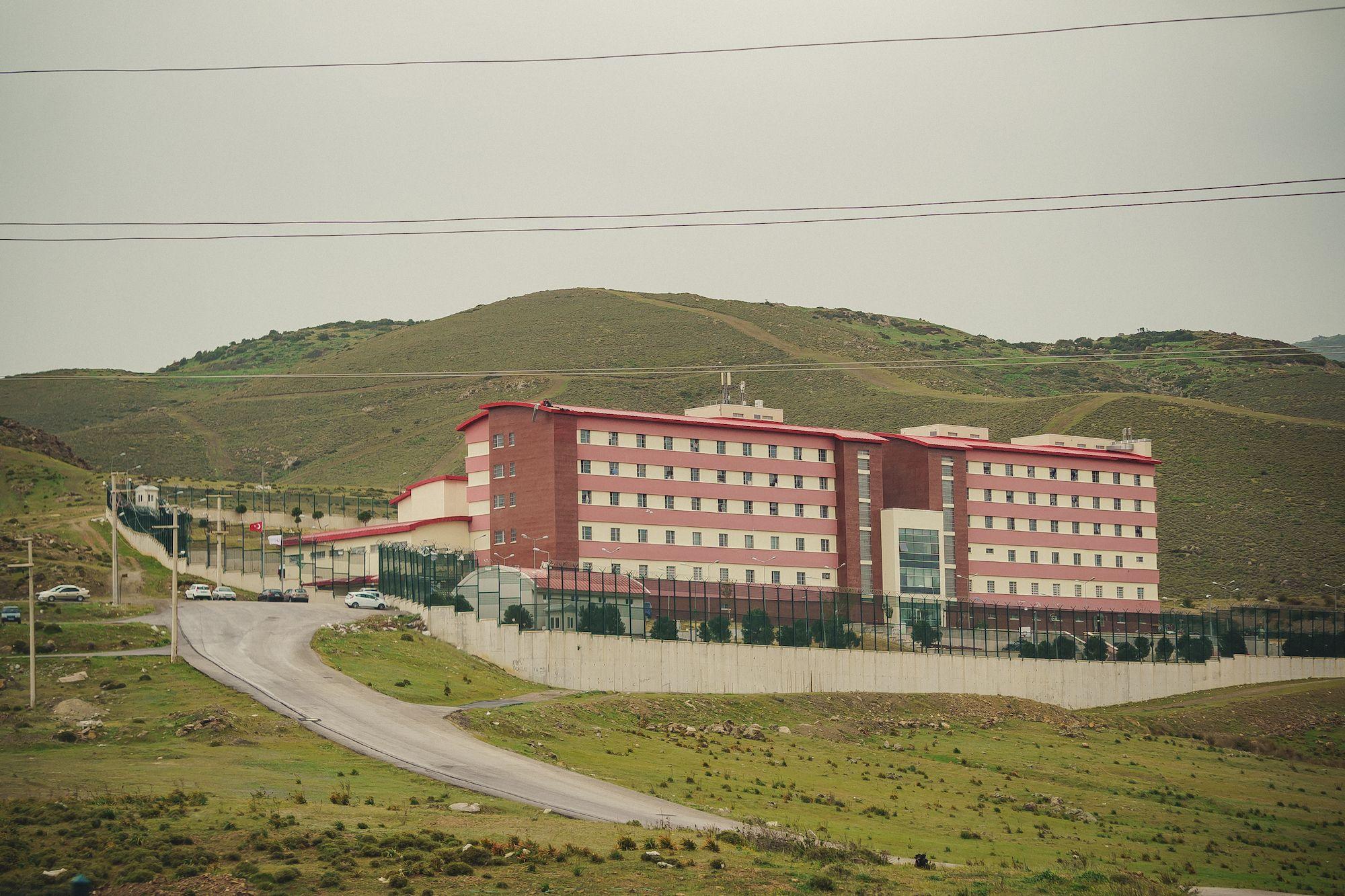
Harmandali Detention Centre. Photo: Ioana Epure
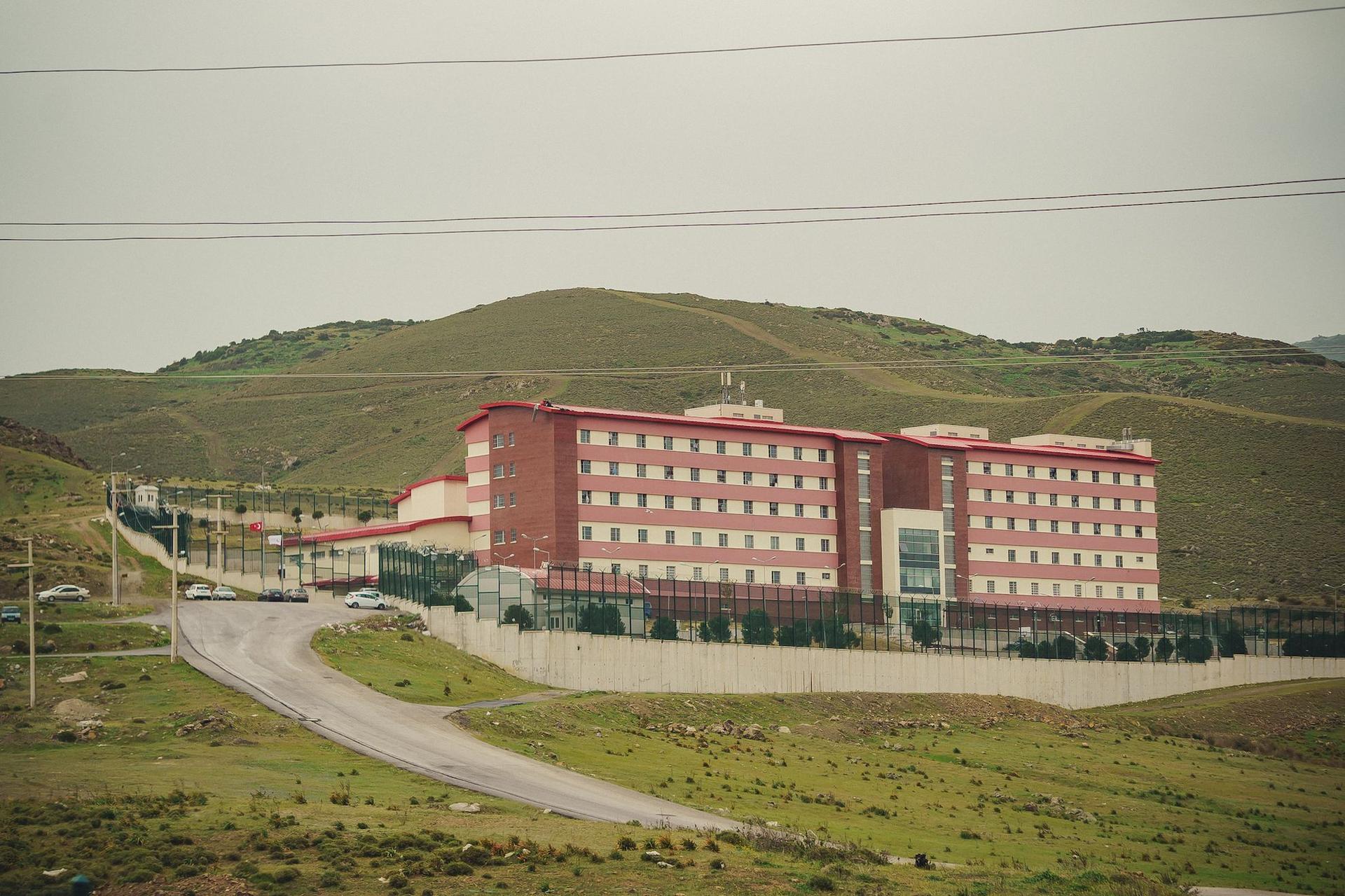
Harmandali Detention Centre. Photo: Ioana Epure
Harmandali, a deportation center that can host up to 750 people, is where people like Khaled end up, if they are caught trying to leave Turkey, whether or not they have refugee status or temporary protection. Once caught, unless they have a good lawyer, they are generally deported.
The same recent report from the Council of Europe that warned of pushbacks also draws attention to conditions in the centre, but also to the fact that many of the migrants detained there find it almost impossible to apply for asylum, even though they are theoretically allowed to do so.
Obstacles include the fact that it is extremely hard for them to communicate with lawyers, because lawyers are not allowed to enter the centre or to call their clients.
The information was also confirmed for PressOne by several Turkish anonymous activists.
On the other side of the strait, in Lesbos and Chios, despite the fact that the residents are against it and that the migrant population on the Greek islands has dropped by 79% since last year, new migrant camps are being built on the islands.
In Kos, Leros and Samos, new camps have already been opened - no longer called camps, but "closed controlled structures" - although there were only a few hundred people left on these islands at the end of 2021. On Lesbos, in April 2022, there were only 1,500 people left (out of more than 6,000 when PressOne reported from the largest refugee camp on the island, in April 2021).
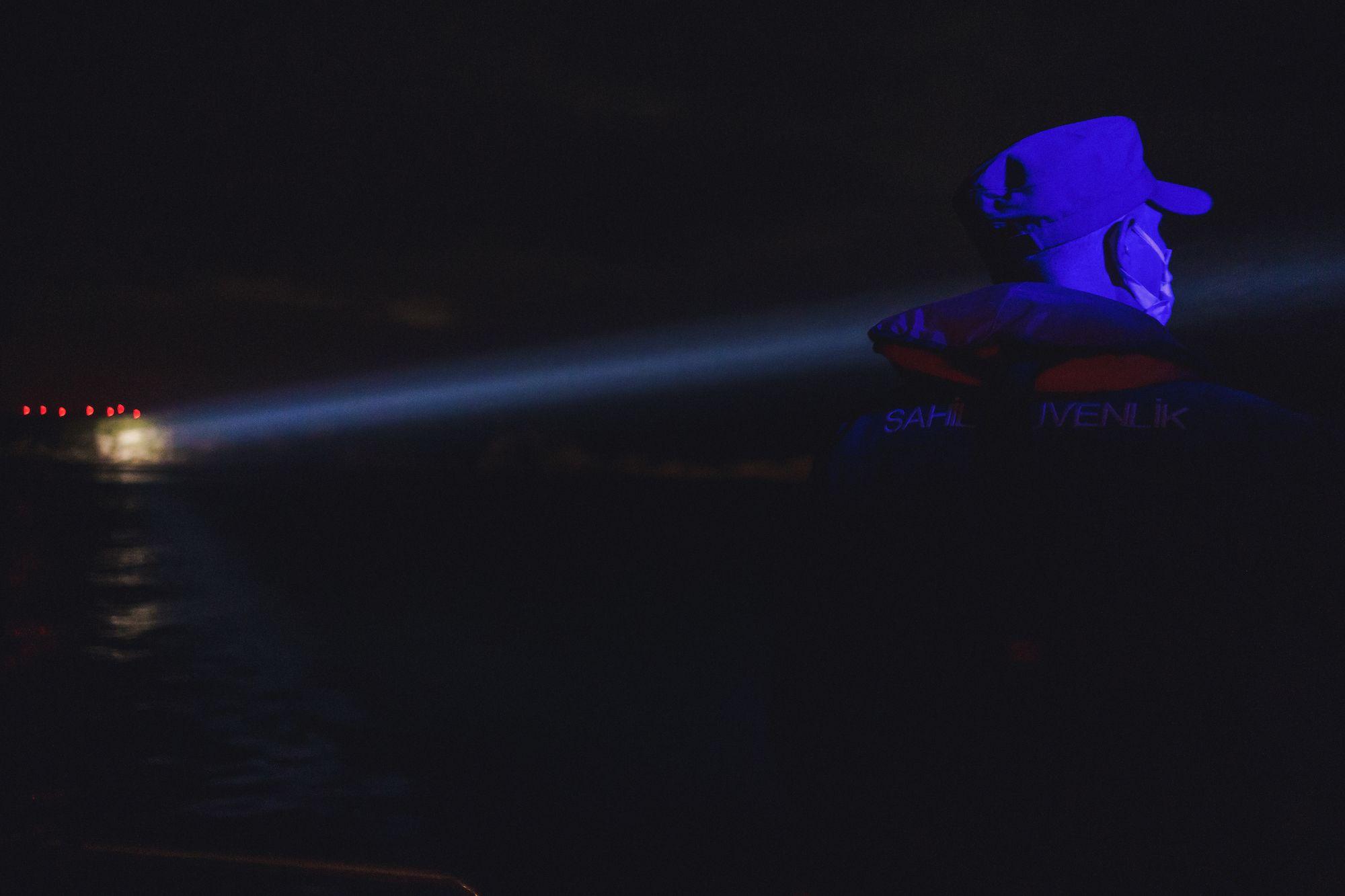
Photo: Ioana Epure
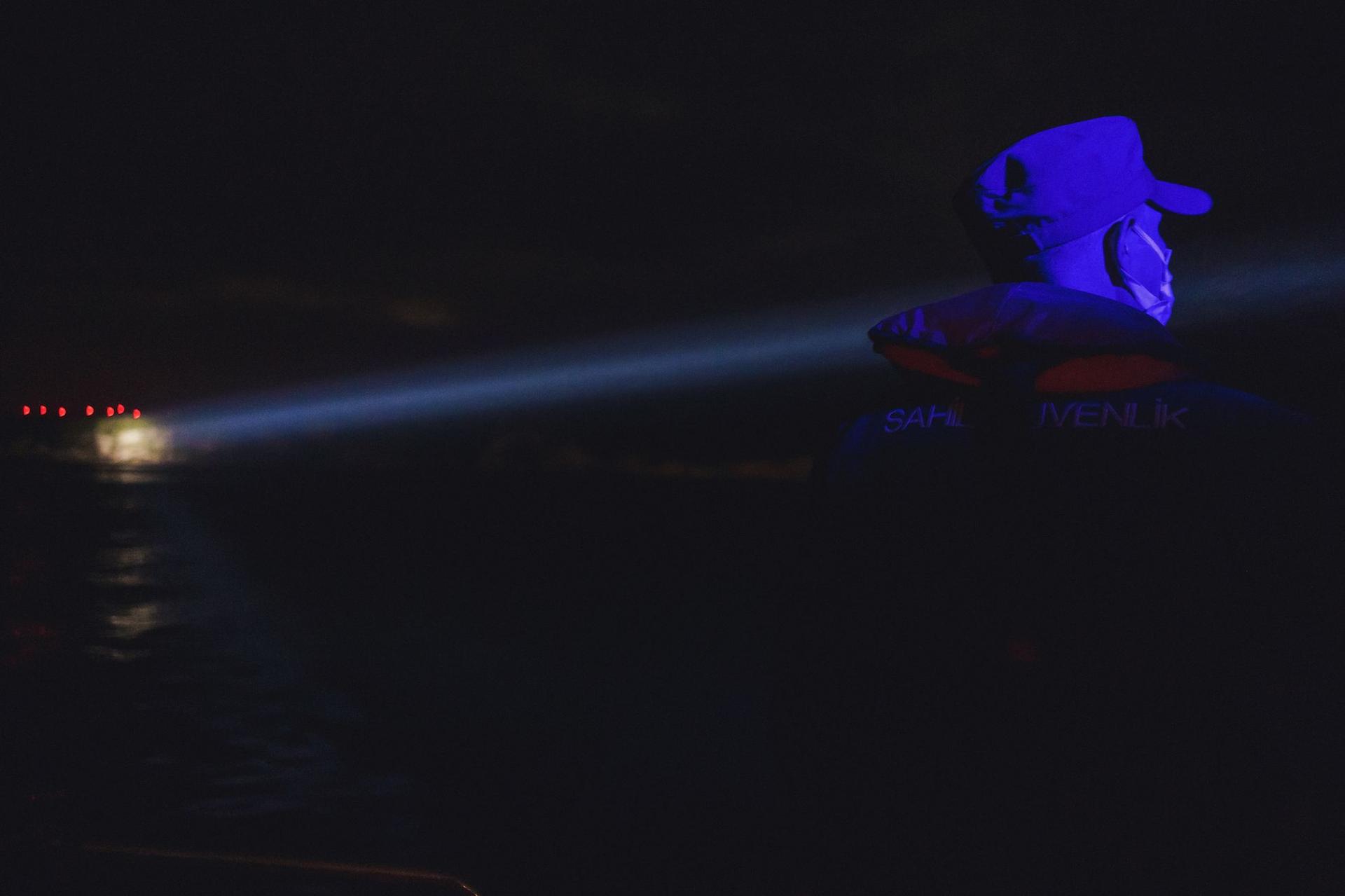
Photo: Ioana Epure
And the new refugee camp on Chios will have a capacity of 1,500 people, even though there are only a few hundred migrants left on the island, most of them living in centres run by NGOs.
For Khaled, however, all this is irrelevant. Everything tends to become irrelevant when you are stranded at sea in the middle of the night in a raft without an engine.
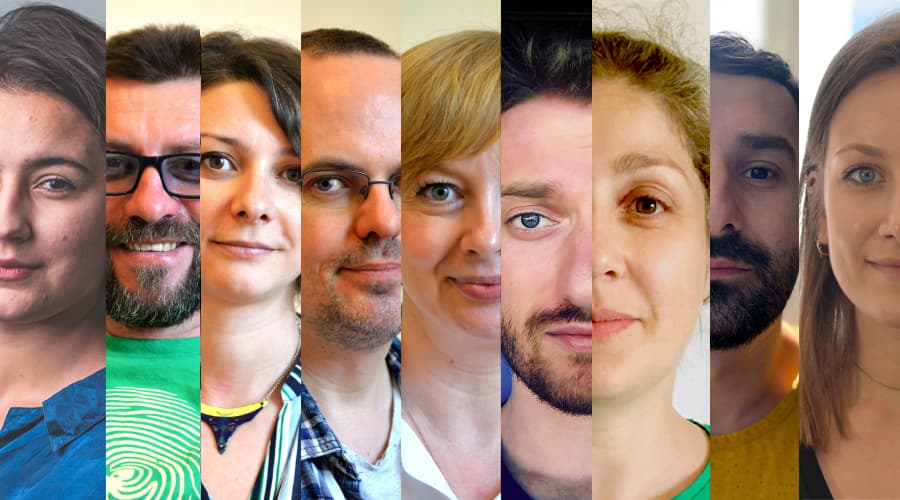
Avem nevoie de ajutorul tău!
Mulți ne citesc, puțini ne susțin. Asta e realitatea. Dar jurnalismul independent și de serviciu public nu se face cu aer, nici cu încurajări, și mai ales nici cu bani de la partide, politicieni sau industriile care creează dependență. Se face, în primul rând, cu bani de la cititori, adică de cei care sunt informați corect, cu mari eforturi, de puținii jurnaliști corecți care au mai rămas în România.
De aceea, este vital pentru noi să fim susținuți de cititorii noștri.
Dacă ne susții cu o sumă mică pe lună sau prin redirecționarea a 3.5% din impozitul tău pe venit, noi vom putea să-ți oferim în continuare jurnalism independent, onest, care merge în profunzime, să ne continuăm lupta contra corupției, plagiatelor, dezinformării, poluării, să facem reportaje imersive despre România reală și să scriem despre oamenii care o transformă în bine. Să dăm zgomotul la o parte și să-ți arătăm ce merită cu adevărat știut din ce se întâmplă în jur.
Ne poți ajuta chiar acum. Orice sumă contează, dar faptul că devii și rămâi abonat PressOne face toată diferența. Poți folosi direct caseta de mai jos sau accesa pagina Susține pentru alte modalități în care ne poți sprijini.
Vrei să ne ajuți? Orice sumă contează.
Share this

